Confessions, a damning dog video and ‘family annihilator’: Key revelations from Alex Murdaugh’s trial
Alex Murdaugh is serving two life sentences after being convicted of the murders of his wife and son. Rachel Sharp explains the most crucial moments in his high-profile trial in South Carolina

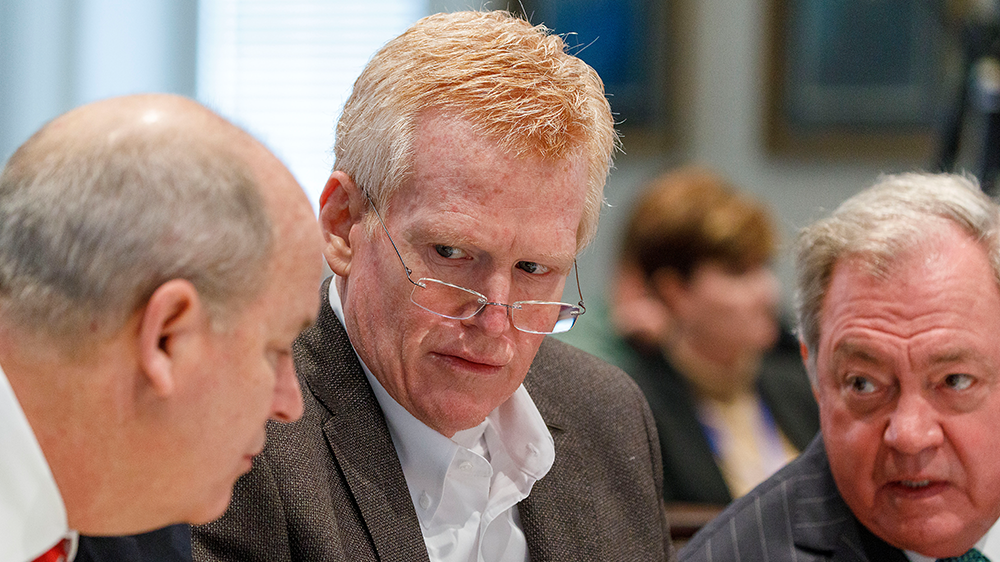
Legal dynasty heir Alex Murdaugh is currently serving two life sentences at a maximum security prison in South Carolina after he was convicted of the brutal double murder of his wife and adult son at his bombshell six-week trial.
Maggie, 52, and Paul, 22, were both shot dead at the family’s sprawling 1,700-acre property in Islandton, South Carolina, on the night of 7 June 2021.
Murdaugh, 55, claimed that he returned home from visiting his elderly mother to find the victims’ bodies at the dog kennels on the land.
This kicked off a dramatic saga surrounding the legal dynasty family including murder, a botched hitman plot, multi-million-dollar fraud schemes and a series of unexplained deaths.
For more than a year after Maggie and Paul’s killings, no arrests were made. Until – in July 2022 – Murdaugh was charged with their murders.
At his high-profile murder trial, prosecutors told the court that Murdaugh killed his wife and son to distract from the growing number of scandals and crimes swirling around him.
The now-disbarred attorney denied the allegations and pleaded not guilty to the charges.
After six weeks of dramatic testimony at the Colleton County Courthouse in Walterboro, the jury took less than three hours to return their verdict on 2 March convicting him on all charges.
Murdaugh was then sentenced to life in prison and is now behind bars at the McCormick Correctional Institution in South Carolina.
Here are the key revelations from the trial:
Prosecutor’s opening statement reveals video will be key to trial
Opening arguments kicked off the trial on 25 January, with the prosecution telling jurors that cellphone records and a video taken by Paul minutes before he died are “critical” in proving Murdaugh’s guilt.
Attorney Creighton Waters gave a timeline for the murders, saying that Paul was shot at the dog kennels first at 8.50pm and Maggie minutes later.
Cellphone records allegedly place Murdaugh at the dog kennels minutes earlier – when the suspect had “told everyone he was never there”.
Mr Waters also described a video Paul made at the kennels minutes before his murder as he was filming a dog to send to a friend. According to the prosecution, three voices – Paul, Maggie and Murdaugh – can be heard.
Other evidence the prosecution promised to show jurors included gunshot residue found in both Murdaugh’s car, on him and on a raincoat that he allegedly left at his parents’ home a week after the murders.
Defence details horror injuries of victims in opening statement
In the defence’s opening statement, Murdaugh was seen breaking down in tears as his attorney Dick Harpootlian described the fatal shot which killed his son Paul, saying it “exploded his brain, like a watermelon”.
Murdaugh then arrived home and found his son’s brains by his feet, he said.
Mr Harpootlian insisted Murdaugh is an innocent man, saying that jurors will see a Snapchat of him and Paul happily spending father-and-son time together less than two hours before the murders.
“Paul, the apple of his eye. You are going to see a video from the night of the murders of Paul and Alex riding around looking at trees they planted, a Snapchat sent to other people. They were laughing, having a good time,” he said.
He also argued that cellphone records from that night are “incomplete” and that Maggie’s phone was thrown on the side of a road halfa mile from the family estate at the same time that Murdaugh was at the property.
The suspect would “have to be Houdini to be in both places”, he said.
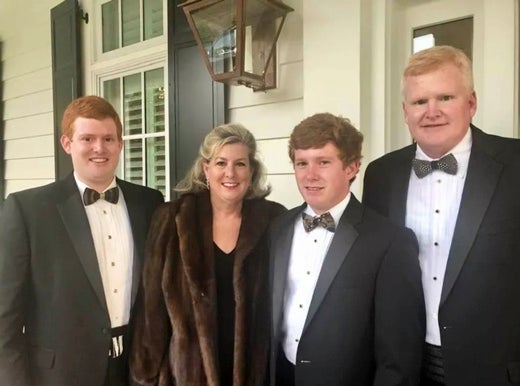
Murdaugh ‘immediately’ told police murders were tied to 2019 boat crash
Murdaugh “immediately” suggested that his wife and son had been murdered because of a 2019 fatal boat crash as soon as the first law enforcement officer arrived on the scene of the grisly slayings, bodycam footage played in court revealed.
The footage was taken from the bodyworn camera of Colleton County Sheriff’s Sgt Daniel Greene when he was the first officer to respond to the scene.
It captures the disgraced legal dynasty heir pacing around the dog kennels, sobbing and wailing, and repeatedly asking: “Are they dead?”
“Has somebody gone to check ‘em? They did check ‘em? They’re sure that they’re dead?” he says.
The first thing Murdaugh tells the officer when he arrives is that he armed himself with a shotgun after finding his wife and son’s bodies.
“Sir I wanted to let you know because of the scene I did go get a gun and bring it down here,” he says.
Unprompted, Murdaugh then tells the officer that the murders must be connected to the 2019 fatal boat crash involving Paul.
“This is a long story. My son was in a boat wreck months back. He’s been getting threats, most of it’s been benign stuf we didn’t take serious... he’s been getting pinched ,” Murdaugh says. “I know that’s what this is.”
At the time of Paul’s death, he was awaiting trial over the death of 19-year-old Mallory Beach.
Paul was allegedly drunk driving a boat of his friends including Beach in 2019 when it crashed and they were thrown overboard. The rest of the group survived but Beach’s body washed up days later.
Paul was charged with boating under the influence and faced up to 25 years in prison.
Murdaugh was also heard mentioning the boat crash in the 911 call alerting law enforcement to the scene and in his first interview with law enforcement on the night of the murders.
In the bodycam, Murdaugh is also seen regaling in great detail his alleged movements that night.
“I came to the house first,” he says. “My mom has late stage Alzheimer’s, my dad is in the hospital. I left, I don’t know what time. I can go on my phone and tell you the exact times,” he says, before suddenly saying: “Did you check?”
Suspect shed ‘no tears’ after finding wife and son’s bodies
Colleton County Sheriff’s Office Sgt Daniel Greene testified that Murdaugh appeared to shed “no tears” after he claimed to have found his wife and son’s bodies.
Sgt Greene told the court that Murdaugh seemed “upset” and repeatedly asked if his wife and son were dead but did not appear to have any physical tears in his eyes.
“Did you ever see any physical tears?” the prosecutor asked.
“I did not,” the officer said.
As bodycam footage from the night of the murders was played in court, Murdaugh was seen breaking down in tears.
Bodycam shows Murdaugh’s ‘clean’ shirt after claiming to touch bloody bodies
Bodycam footage from the night of the murders revealed Murdaugh wearing a “clean” white shirt after he claimed he touched his wife and son’s bloodied bodies on finding them shot dead.
In the footage, Murdaugh is dressed in a white T-shirt and dark shorts with no obvious signs of blood.
During courtroom testimony, multiple law enforcement officials described how Murdaugh was “clean” and did not appear to have any blood on him when they arrived on the scene of the murders.
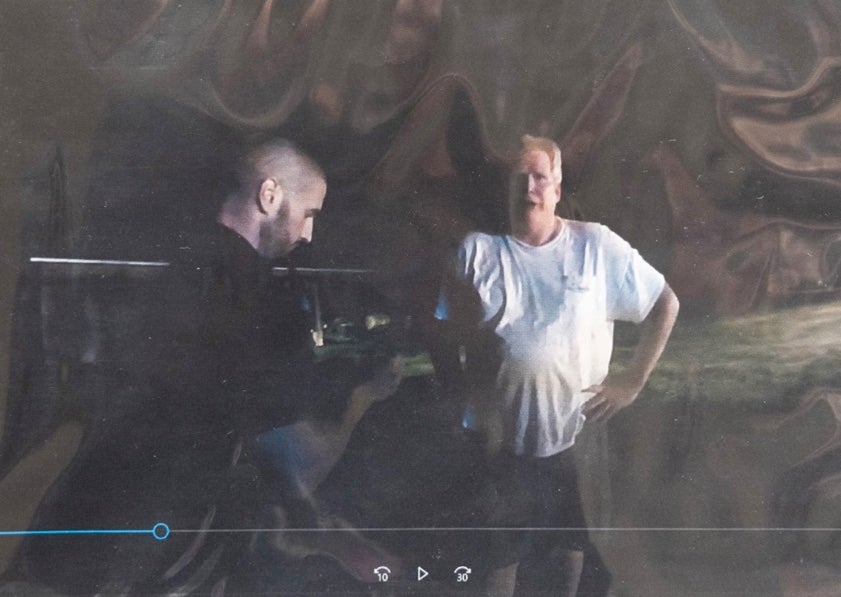
Yet, according to the 911 call made by Murdaugh and bodycam footage from his first police interview on the night of the murders, Murdaugh claims he touched his wife and son’s bodies when he found them by the kennels.
In the interview footage, he is heard telling law enforcement twice that he “tried to turn over” his son’s bloodied body and that he had checked him and his wife for pulses.
“I could see his brain ... I ran over to Maggie, actually I think I tried to turn Paul over first... um... you know, I tried to turn him over, I dunno, I figured it out,” he is heard saying.
Murdaugh said that his son’s cellphone fell from his pocket when he tried to move him and that he handled it briefly.
“His cell phone popped out of his pocket, I started trying to do something with it but I put it back down really quickly, and then I went to my wife,” he says.
Detective Laura Rutland of Colleton County Sheriff’s Office contradicted his version of events as she said that Murdaugh was “clean from head to toe” with no signs of blood on his body, shirt, shorts or shoes.
She said she didn’t say where he checked for a pulse but, in a gripping reenactment, agreed that if Murdaugh had touched pulse points on Paul’s neck or wrists he would have been covered in blood.
As jurors have previously heard, the crime scene was especially violent and bloody, with Paul’s brain shot out of his skull and both he and Maggie lying in pools of their own blood.
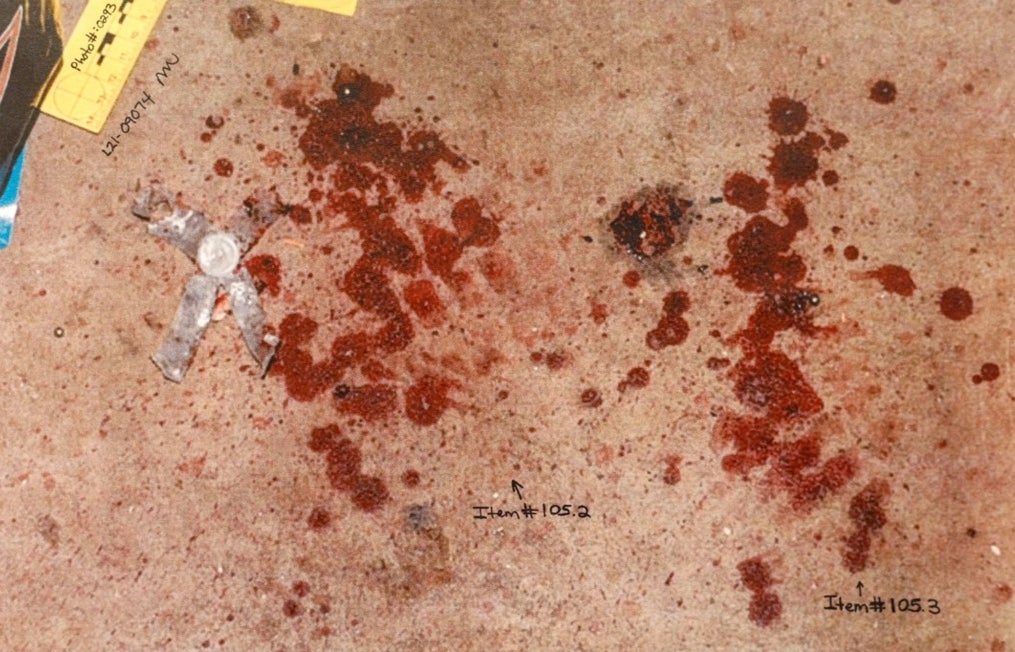
911 call played at trial
The unredacted 911 call placed by Murdaugh on the night of the murders.
In the dramatic audio, Murdaugh cries and and sobs down the phone as he tells the dispatcher “it’s bad” and “my wife and child have been shot badly”.
He also the dispatcher about the 2019 boat crash involving Paul, saying that the 22-year-old had been getting threats “for months and months and months”.
The attorney then says he is going back to his house to get a gun “just in case”. When officers arrived on the scene, Murdaugh had a shotgun which he handed over.
Murdaugh tells wild story about Black Panthers
Murdaugh recounted a wild story about a farmhand claiming to “kill radical Black Panthers” when he was interviewed by law enforcement on the night of the double murder of his wife and son.
In footage of the interview, Murdaugh says he can’t think of anyone “overly suspicious” who could be responsible for the murders but suggests law enforcement speak to a farmhand he had recently hired to work at the 1,700-acre estate.
Murdaugh claims that the man had told Paul a “really weird” story just one week before the murders.
“He told Paul a story the other day of how when he was in high school he got in a fight with some Black guys and an FBI undercover teams observed him fighting those guys,” he says. “And they put him on an undercover team with three Navy Seals and their job was to kill radical Black Panthers.”
He adds: “Paul was so taken aback by it that he recorded it on his phone”.
Murdaugh tells the officers that Paul had “been working with him a lot” and the story was “really weird”.
However, he adds that he doesn’t believe the man could be behind the murders, saying that it’s “such a stupid” that he was “embarrassed” to even bring it up.
Speculation over whether Murdaugh accidentally confessed
Audio from Murdaugh’s second interview with law enforcement was played in court on 30 January, revealing that the disgraced legal dynasty heir may have unwittingly slipped up and confessed to the murders of his wife and son.
“I did him so bad,” a sobbing Murdaugh appeared to say about his son in a police interview on 10 June 2021.
SLED Special Agent Jeff Croft was asked by prosecutor Creighton Waters to clarify what he heard Murdaugh saying.
“It’s just so bad. I did him so bad,” he responded.
While prosecutors sought to suggest that the 54-year-old father and husband slipped up during the police interview, Murdaugh was seen shaking his head and appearing to mouth “I did not say that” to his attorneys in court.
However, the audio of the interview has also raised doubts, being somewhat unclear as to whether Murdaugh says “I” or “they”, with some inside and outside court believing he actually says: “They did him so bad.”
During cross-examination, Griffin grilled Agent Croft as to why – if Murdaugh’s statement raised alarm bells – he didn’t follow up on it.
The special agent testified that he “made a mental note” about Murdaugh’s comment but said it was early in the investigation when officials were in more of an “information gathering” stage.
The audio was played again in court – twice in real time and once at one-third speed.
When asked by Mr Griffin if he heard “they” not “I” when the recording was slowed down, Agent Croft testified that he still heard “I”.
Guns and ammo at Murdaugh home match crime scene
Bodycam footage released by the court on 30 January revealed a huge stash of firearms inside the Murdaugh family home in the days after the murders.
SLED Special Agent Jeff Croft told jurors how he seized firearms and ammunition from the Murdaugh home – including weapons and ammo that matched the type of gun and bullets used to kill Maggie and Paul.
A .300 Blackout semiautomatic rifle, 12-gauge Browning shotgun, Benelli shotgun and 12-gauge pump shotgun which were seized from the family home were all brought into the courtroom and shown to jurors.
The agent testified that several empty boxes of ammunition were also found during searches of the Murdaugh home on 8 June and 13 June.
Inside the .300 Blackout rifle was Sellier & Bellot .300 AAC BLK ammo – the same type of ammo that was used to kill Maggie.
Also seized as evidence was a credit card receipt for an $1,021.10 item from Gucci – the item had been circled.
On 31 January, Agent Croft also testified that ammunition – steel shot ammo specifically Winchester DryLok – matching the fatal shot fired through Paul’s brain had been located on the Murdaugh family property.
Two separate guns – a rifle and shotgun – were used to kill Maggie and Paul. They have never been found.
Defence’s two shooters’ theory
Murdaugh’s legal team sought to push its theory that there could have been two shooters separately responsible for killing the mother and son.
Jurors were shown photos and diagrams of the crime scene from both the night of the murders and more than one month later on 16 July, with defence attorney Dick Harpootlian honing in on two bullet projectiles in particular – one that travelled through the dog house and one through the quail pen.
Under cross-examination of SLED special agent Melinda Worley, Mr Harpootlian pushed the idea that, because the bullet projectiles were shot at different angles, it was a “reasonable” possibility that there was two killers.
“One reasonable explanation is there are two people there: one with a shotgun, one with an AR. Could someone have been a lookout, they went there to kill Paul and Maggie surprised them?” Mr Harpootlian pressed.
Agent Worley admitted that the theory is “possible” but said that it is only one “one explanation” as to what may have taken place that fateful night. She added that the angles could also be explained as one single shooter moving around.
Victims’ last texts and calls revealed
Jurors learned about the final text messages and phone calls made by Paul and Maggie before their brutal murders.
On the night of 7 June 2021, Paul placed a call on his cellphone to friend Rogan Gibson at 8.40pm, lasting four minutes, followed by a second call at 8.44pm. The second was the last incoming communication Mr Gibson received from Paul’s cellphone.
Five minutes later, at 8.49pm, Mr Gibson sent Paul a text message: “See if you can get a good picture of it. Marion wants to send it to a girl we know that’s a vet. Get him to sit and stay. He shouldn’t move around too much.”
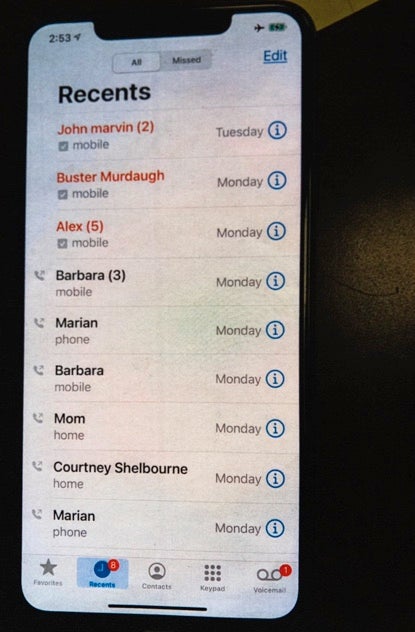
The message – believed to be about a dog Paul was taking care of for him – went unanswered.
From that point onward, neither Paul nor his mother Maggie responded to any messages or calls on their cellphones.
Prosecutors said in opening statements that Paul was shot dead first at 8.50pm and Maggie minutes later. Their cellphones had no activity from 8.49pm onward.
After sending the text message at 8.49pm and receiving no response from his friend, Mr Gibson sent a follow-up text at 9.58pm, which simply read: “Yo.”
Mr Gibson also tried calling Paul multiple times at 9.10pm, 9.29pm, 9.42pm, 9.57pm and 10.08pm.
Getting no response from his friend, jurors heard that he also texted Paul’s mother Maggie at 9.34pm, saying: “Tell Paul to call me.”
Shortly after, Mr Gibson had four missed calls from Alex Murdaugh at 10.21pm, 10.24pm, 10.25pm and 10.30pm.
Doubts cast on preservation of crime scene
During much of his cross-examination of SLED Special Agent Worley, Mr Harpootlian sought to pick holes in the evidence gathered from the bloody crime scene.
He raised doubts about a mark or potential footprint spotted on Maggie’s calf on the night of the murders.
While Mr Harpootlian suggested it was a “footwear impression”, Agent Worley said she “couldn’t say” that was what the mark was but that it “could be”.
The mark was not examined on the scene and no impression of the imprint was taken, she testified.
She also confirmed that a bloody footprint found in the feeding room was later determined to be that of a law enforcement officer – something that supported the defence’s line of questioning that some evidence was not preserved correctly and was even “destroyed”.
“Do you know what other evidence they may have destroyed?” asked Mr Harpootlian.
“I have no idea,” the agent said, to which he responded: “That’s right you don’t.”
Murdaugh’s cousin testifies he sold him guns – matching one used to kill Maggie
On 31 January, Mr Murdaugh’s cousin John Bedingfield testified against him, revealing how the 54-year-old bought several firearms from him in the years prior to the murders – ones that match the type used to kill Maggie.
Mr Bedingfield, who works for the Department of Natural Resources but has a side business making and selling firearms under a federal licence, told the court that Murdaugh approached him before Christmas 2016 wanting to buy both Paul and his surviving son rifles as presents.
He purchased two subsonic 300 BlackOut rifles – one black, one tan colour – for $9,188 so his sons could hunt hogs, he testified.
Two years later in April 2018, he said that Murdaugh bought a third rifle from him for $875 because he said that Paul had lost his other one.
Murdaugh’s chilling text message to wife after murders revealed
Murdaugh’s chilling final text to his wife moments after he allegedly killed her and their son was also revealed in court during the state’s case.
Jurors were shown data from the cellphones of Maggie, Paul and Murdaugh on the night of the murders.
Prosecutors say that Murdaugh shot Paul first at 8.50pm and Maggie after.
Almost immediately after, cellphone data shows Murdaugh made several calls to Maggie and other family members.
Murdaugh first called Maggie at 9.04pm – minutes after he allegedly shot her dead – and the call went to voicemail.
He then texted her phone at 9.08pm, claiming he was going to visit his mother: “Going to check on M. Be right back.” The text was never read.
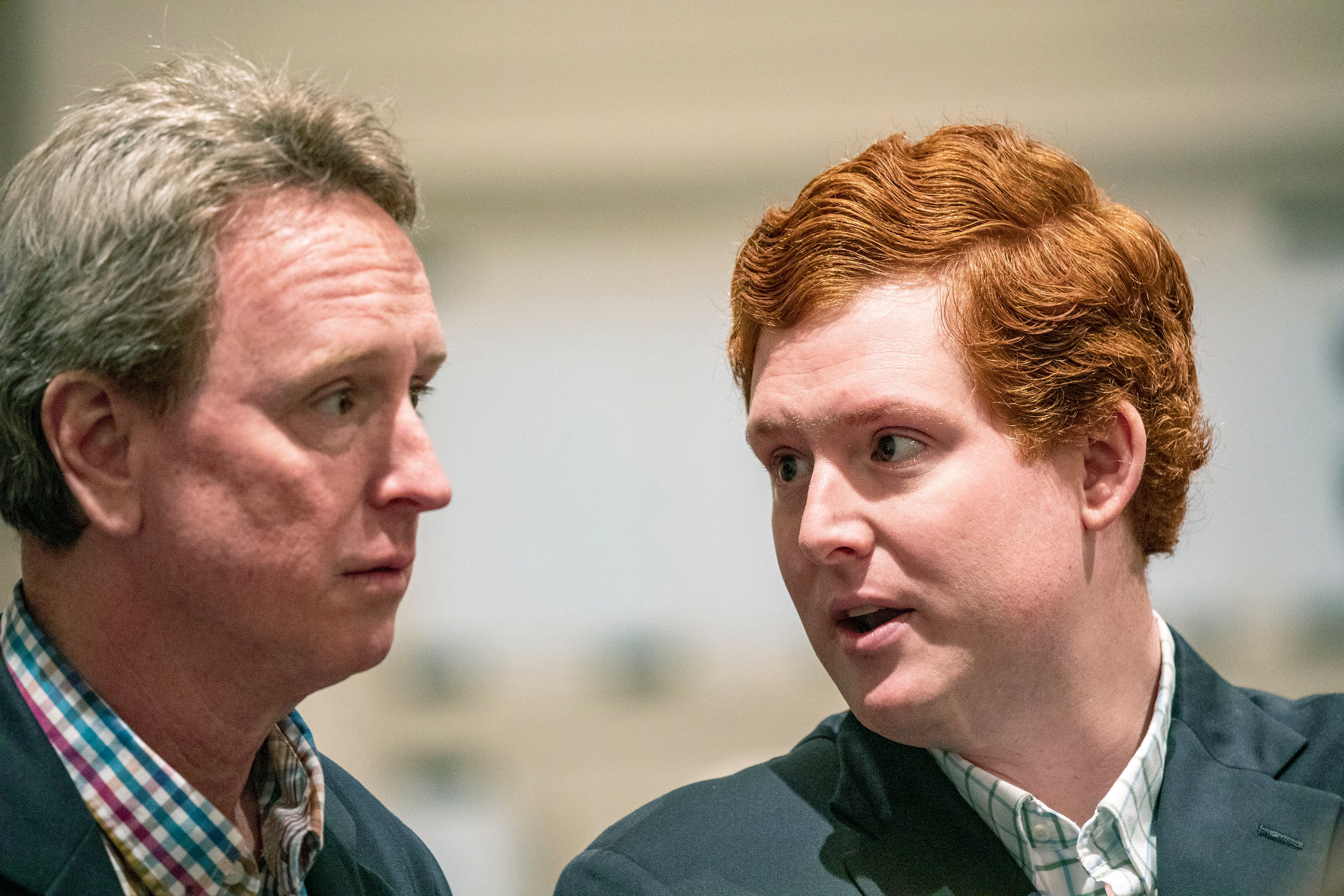
In total, Murdaugh called his wife five times between 9.04pm and 10.03pm after allegedly killing her. None of the calls were answered.
His last text message to his wife came at 9.47pm, writing: “Call me babe.”
As well as calling Maggie, Murdaugh’s cellphone records show he also made several calls to other numbers in the hour between the time prosecutors say the murder took place and he called 911. Prosecutors allege that Murdaugh was seeking to build an alibi for that night.
Minutes after the final call, Murdaugh called 911 at 10.07pm claiming to have found Maggie and Paul’s bodies.
Someone was holding and moving with Maggie’s cellphone after murder
SLED Lt. Britt Dove, who works in the computer crimes centre, testified that he processed the three cellphones.
Based on the cellphone data, he said that the last text Maggie read was a message from her sister-in-law Lynn Murdaugh in a group chat which she read at 8.49pm.
After 8.49pm, she didn’t open or respond to messages or calls from several people including her husband, oldest son Buster and Murdaugh’s brother John Marvin Murdaugh.
Jurors also heard how the cellphone data shows Maggie’s phone orientation changed from portrait to landscape at 8.54pm and then again at 9.06pm, indicating that it was in someone’s hands. One minute later, at 9.07pm the screen went on and off as though someone tried – but failed – to unlock it.
Health app data was also presented to jurors, showing that Maggie’s cellphone recorded 59 steps in two minutes after 8.53pm – after prosecutors allege Maggie and Paul were already dead.
“It tells me someone was holding this phone and took steps, and it recorded those steps,” said Lt Dove.
Maggie’s phone was locked between 8.49pm on 7 June 2021 and 1.10pm the following day when it was found dumped by the side of a road around a quarter of a mile from the Murdaugh property.
Paul’s cellphone was also initially locked after the murders, until US Secret Service Digital Forensic Examiner Jonathan VanHouten testified that he managed to unlock when he successfully tried Paul’s birthday as his passcode.
Witnesses say voice in murder scene video is Alex Murdaugh
In a dramatic day on 1 February, jurors were shown cellphone footage taken by Paul at the dog kennels just minutes before he and Maggie were shot dead which cast doubts on Murdaugh’s alibi.
Off-camera, three voices are heard – Paul, Maggie and a man prosecutors said is Murdaugh.
In dramatic testimony, two friends of Paul with close ties to the family told jurors that they are “100 per cent sure” that the voice belongs to Murdaugh.
Cellphone data shows that the video was recorded for 58 seconds from 8.44.49pm to 8.45.47pm – less than five minutes before the murders. The disbarred attorney has claimed he was napping at the family home at that time.
Rogan Gibson, who had known Paul since they were young and described the Murdaughs as his “second family”, testified that he was “100 per cent sure” Murdaugh is the voice in the footage. A second friend Will Loving echoed this.
As the footage was played in court, Murdaugh appeared to rock his head up and down and cry.
Snapchat shows Alex Murdaugh in different clothing one hour before murders
Jurors were shown a Snapchat video Paul sent to Mr Loving less than one hour before he and Maggie were murdered.
The video, sent at 7.56pm on 7 June 2021, shows Murdaugh on the grounds of the family estate.
In the footage, Murdaugh, 54, is seen dressed in trousers, loafers and a blue button-down shirt – clothing that does not match what he is seen wearing in police bodycam footage in the aftermath of the murders.
In the bodycam footage, shown in court last week, the disgraced attorney is dressed in a white short-sleeved t-shirt and shorts.
Questions had already raised about this outfit as multiple law enforcement officials have testified that Murdaugh and his clothing were “clean from head to toe” – despite his claims he had touched the bloody bodies of his wife and son.
It is not yet clear if investigators ever located or seized the second outfit Murdaugh is seen wearing in the Snapchat video and jurors are yet to hear an explanation from the defence.
Less than one hour on from the 7.56pm Snapchat, Paul and Maggie were shot dead at around 8.50pm.
Murder timeframe narrowed down to eight-second window
Prosecutors claim that Paul was shot dead first at around 8.50pm, followed by Maggie – with cellphone data being used to narrow down the murders to a precise eight-second window.
SLED Lt. Britt Dove testified that Paul’s last phone activity was at 8.48.59pm and Maggie’s was at 8.49.27pm.
Eight seconds later at 8.49.35pm, Paul received a text message but it went unread. Neither Maggie nor Paul used their phones after that time.
Calls Murdaugh made to wife on night of murders ‘deleted’
In dramatic courtroom testimony, jurors heard that calls Murdaugh made to his wife on the night of the murders were mysteriously later “deleted” from his call log.
Lt Dove testified that Mr Murdaugh had called Maggie five times between 9.04pm and 10.03pm on the night of 7 June 2021 after he had allegedly killed her and Paul. None of the calls were answered.
But, according to the call log on his cellphone, Murdaugh did not place or receive any calls between 4.35pm on 4 June and 10.25pm on 7 June.
Lt Dove, who processed the three cellphones belonging to Murdaugh, Maggie and Paul, testified that the trove of phone calls Mr Murdaugh made to his wife’s cellphone after he allegedly shot the victims dead was missing from his call log.
The only explanation for the missing data is that the call logs were manually and intentionally deleted by someone between the 7 June 2021 murders and his phone being seized by authorities in September 2021, he said.
Defence casts doubt on theory Murdaugh took Maggie’s phone
Under cross-examination, the defence cast doubt on the theory that it could have been Murdaugh who threw Maggie’s phone along the side of Moselle Road.
Lt Dove admitted that cellphone data suggested Maggie and Murdaugh’s phones were not in the same place at the same time at 9.06pm as the step data did not match.
This was important because 9.06pm is when the final orientation change – or movement – was recorded on Maggie’s phone.
Lt Dove testified that this movement could have been as it was being thrown from a vehicle to where it was discovered the next day, with the defence contending that Murdaugh was at the family property walking with his cellphone at that time.
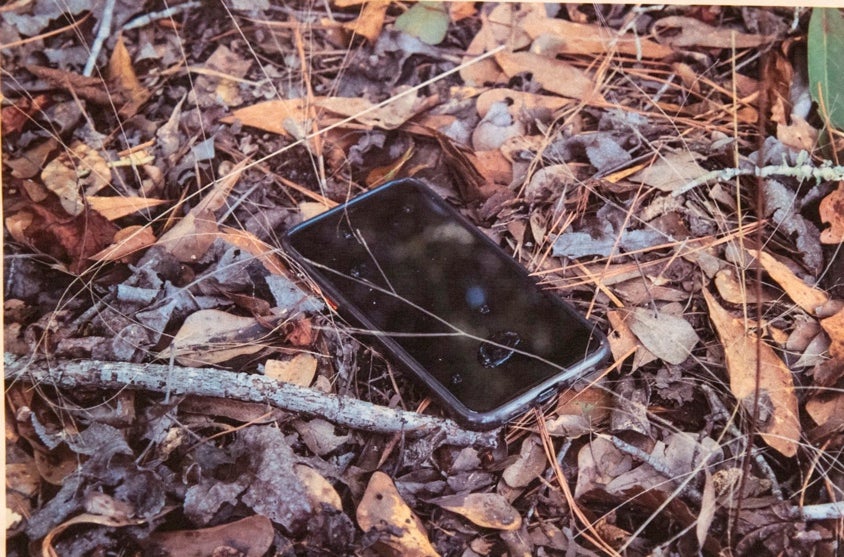
However, under redirect, prosecutors cast doubt on the defence’s timeframe for when the phone was tossed down Moselle Lane, as Lt Dove testified that an orientation change can only take place when the phone screen is on.
The SLED agent testified that the screen on Maggie’s phone was off between 9.07pm and 9.31pm so if the phone was thrown from a car during that time, there would have been no orientation change recorded.
Shadow trial hears evidence of Murdaugh’s alleged multi-million-dollar fraud
In court on 2 and 3 February, several witnesses testified without the jury present as the judge weighed whether to allow evidence of Murdaugh’s alleged financial crimes to be presented at trial.
Prosecutors claimed that Murdaugh’s alleged financial crimes are key to proving the motive while the defence asked the judge to throw the evidence out of the trial.
On 7 February, the judge ruled in the state’s favour that evidence about Murdaugh’s financial crimes is admissible in court – dealing a blow to the defence and leading the state to recall the financial witnesses to redeliver their testimony in the presence of the jury.
At the time of the murders, Murdaugh’s law firm PMPED was closing in on his alleged multi-million-dollar fraud scheme with a colleague confronting him about it on the morning of the killings.
His finances were also coming under intense scrutiny in a lawsuit brought by the family of Mallory Beach – a 19-year-old woman who died in a 2019 crash in the Murdaugh family boat. A hearing for the boat crash lawsuit was also scheduled for the week of the murders. It was postponed following Maggie and Paul’s murders.
Now, separate from his murder trial, Murdaugh is currently facing around 100 charges for stealing almost $8.5m from law firm clients dating back to 2011. The attorney, who has since been disbarred, represented the clients in wrongful death lawsuits before allegedly pocketing the settlement money for himself.
Murdaugh’s best friend sobs as he reveals how suspect stole money
Murdaugh’s former best friend of 40 years broke down in tears in court as he described the moment that he learned the disgraced attorney had stolen millions of dollars from his law firm clients – and $192,000 from himself.
Chris Wilson choked up with emotion as he said the betrayal “knocked me down” and revealed that “I don’t know how to think any more” about the man he had known and “loved” for most of his life.
Mr Wilson testified that the two attorneys worked on a case together where Murdaugh made a $792,000 cut.
At Murdaugh’s request, Mr Wilson made the check payable directly to him instead of PMPED. Then, in July 2021 – one month on from the murders – Mr Wilson said that his friend got in touch saying he had been unable to structure the fees as planned and needed to pay the money back and have it paid directly to PMPED.
Murdaugh only had $600,000 to pay it back, with Mr Wilson saying that he covered the additional $192,000, on the basis that Murdaugh would pay him back.
On 3 September 2021 – three months on from the murders – Mr Wilson said he finally learned his friend had been scamming him and many other people. He confronted him the next day.
Choking back tears, Mr Wilson revealed that his longtime friend broke down and confessed to stealing the money to fund a secret 20-year opioid addiction.
“He broke down crying,” he said. “I was so mad. I had loved the guy for so long, and I probably still loved him a little bit, but I was so mad, and I don’t remember how it ended. How did I not know these things or see these things?”
Law firm CFO confronted Murdaugh about missing money on day of murders
Jeanne Seckinger, the CFO at PMPED, revealed she had confronted Murdaugh over missing payments on the day of Maggie and Paul’s murders.
She told the court that by 7 June 2021 the law firm partners had noticed $792,000 worth of legal fees missing from the case he worked with Mr Wilson.
When she approached Murdaugh to ask him about it that morning she said he gave her a “dirty look” – something that she said she had “ever received from him before”.
Hours later, Maggie and Paul were shot dead.
Over the coming months, the law firm partners uncovered an alleged multi-million-dollar fraud scheme where he had stolen millions from their clients and pocketed it himself – reaching a head with the confrontation and resignation on 3 September.
The day after he was forced to resign, Murdaugh was shot in the head in what turned out to be a botched hitman plot.
Son of housekeeper accuses Murdaugh of stealing $4m after her mystery death
Murdaugh was accused of stealing a $4m settlement from his late housekeeper’s family, where prosecutors also raised questions about her mystery death.
Gloria Satterfield worked as the Murdaugh family’s housekeeper and nanny for more than 20 years, before she died in a mysterious trip and fall at the family home in 2018.
Her son Tony Satterfield told the court how Murdaugh allegedly swindled almost $4m in a wrongful death lawsuit payout from the family in the aftermath of her death.
The court was shown evidence of two separate settlements in the wrongful death suit – one for $505,000 and one for $3.8m. Mr Satterfield testified that Murdaugh did not tell him about the settlements and that he did not receive “one cent” of the money.
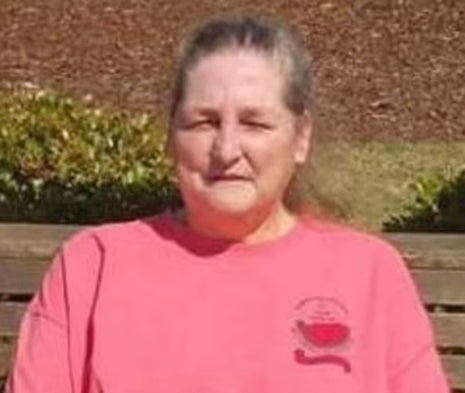
In June 2021 – the same month that Maggie and Paul were shot dead – there were reports in the media about a settlement and Mr Satterfield said he chased Murdaugh about the progress of the case.
Unbeknown to him, Murdaugh had already allegedly received payouts and pocketed them for himself.
Now, Murdaugh is charged with almost 30 criminal charges over the Satterfield settlement.
Prosecutor Creighton Waters also hinted at the ongoing uncertainty about the nature of her death.
“Was she able to say how she fell?” he asked.
“No she was not,” Mr Satterfied replied.
At the time, Satterfield’s death was regarded as an accidental fall – however her death certificate cited her manner of death as “natural”.
In September 2021, SLED announced that it was reopening an investigation into her death and, in early 2022, officials announced plans to exhume her body. The investigation is still ongoing and her body is yet to be exhumed.
Boat crash attorney says ‘fuse was lit’ to expose Murdaugh’s financial crimes
Attorney Mark Tinsley testified without the jury present about the lawsuit he brought against Murdaugh on behalf of the family of Mallory Beach and how it was putting his finances under increased scrutiny at the time of the murders.
Mr Tinsley told the court the Murdaugh claimed he was broke and couldn’t pay the settlement he was asking for his clients.
He didn’t believe this – so he filed a motion compelling Murdaugh to reveal his finances.
A hearing for the suit had been scheduled to take place on 10 June 2021 and Mr Tinsley testified that he expected to take the lawsuit to trial in the late summer of 2021. But, the proceedings were derailed because of the murders.
He said that the “fuse had been lit” to expose Murdaugh’s slew of alleged financial crimes – but that his problems would likely “be over” if the family was the “victim of an unspeakable tragedy”.
“Pretty quickly, I recognised that the case against Alex, if he were in fact the victim of some vigilante, would be over,” he said.
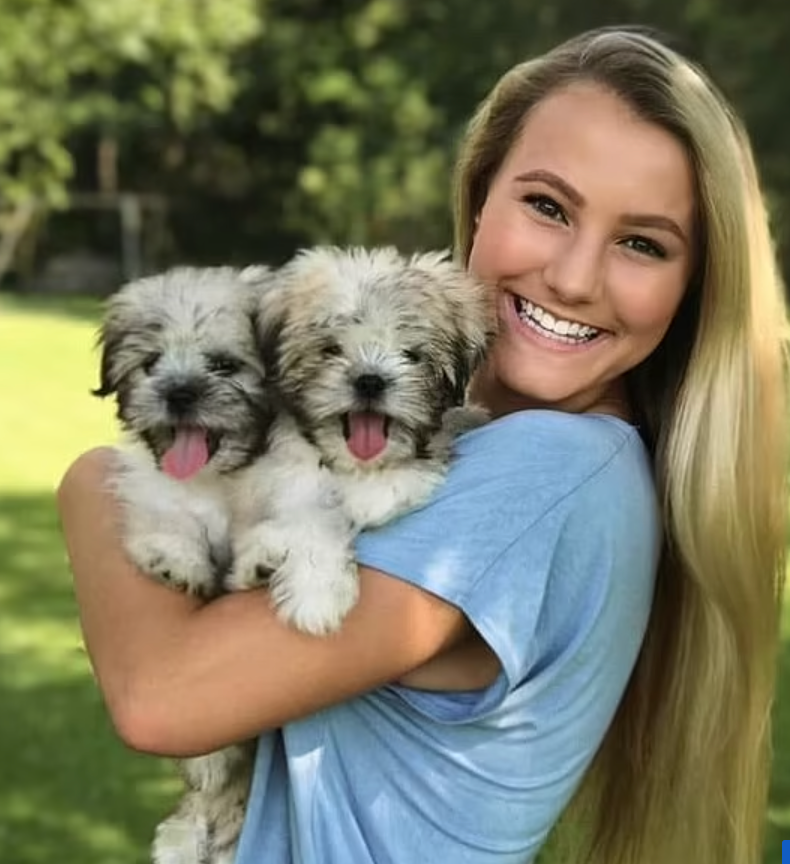
If the disgraced attorney was the “victim of an unspeakable tragedy” then no jury would side against him in the case, Mr Tinsley said.
He later testified: “There wouldn’t have been an explosion June 10. But the fuse was lit the moment that information became available in this case.”
He added that Murdaugh “knew it was going to unravel” and that “the fuse was lit when he started stealing money”.
Under redirect, the witness testified that if the hearing had taken place on 10 June it would have set in motion the process that wouldn’t have stopped until Murdaugh either settled the case or disclosed his finances.
Caretaker says ‘fidgety’ Murdaugh lied about alibi – and offered her money
Muschelle “Shelly” Smith, who worked as a caregiver to Murdaugh’s mother Libby from October 2019, told jurors about Mr Murdaugh’s unusual behaviour both on the night of the murders and in the days that followed.
She testified that a “fidgety” Murdaugh showed up at his sick mother’s house between 8.30pm and 9.30pm on the night of 7 June 2021 – then left 20 minutes later.
She testified that it was “unusual” for him to visit at night and he was “fidgety”.
A few days after the murders, she testified that Murdaugh spoke to her about his visit that night, telling her to tell authorities that he had stayed at his parents’ house for double the length of time that he had.
“I was here 30 to 40 minutes,” she said he told her.
The conversation left her feeling “nervous”, she said – so much so that she called her brother who is a police officer to relay what he had said to her.
Days after that initial conversation, Murdaugh spoke to her again – this time offering “to help her out” with paying for her upcoming wedding and putting in a good word for her with her other job.
Ms Smith broke down in tears describing Murdaugh and his family as a “good family” and told jurors under cross-examination that she believes his offers were simply him being a “good person”.
Blue tarp or blue raincoat?
Days after Murdaugh’s offer with wedding expenses, Ms Smith testified that Murdaugh showed up at his mother’s house at 6.30am in the morning cradling a “blue something”.
She said he took it upstairs and left it before leaving again.
She also noticed for the first time that he had a cut or bruise on his forehead.
He returned sometime later that day driving a white truck, which he then left at the property and switched to a black truck.
Prosecutors said that law enforcement found a blue tarp and a blue rainjacket in a search of the home. The state says that gunshot residue was found on the jacket.
Under cross-examination, Ms Smith insisted that the item she saw him carrying was a “blue tarp” and not a blue rainjacket.
However, under redirect she was shown a photo of a “bundled up blue item” and asked if that was what she had seen. She confirmed it was.
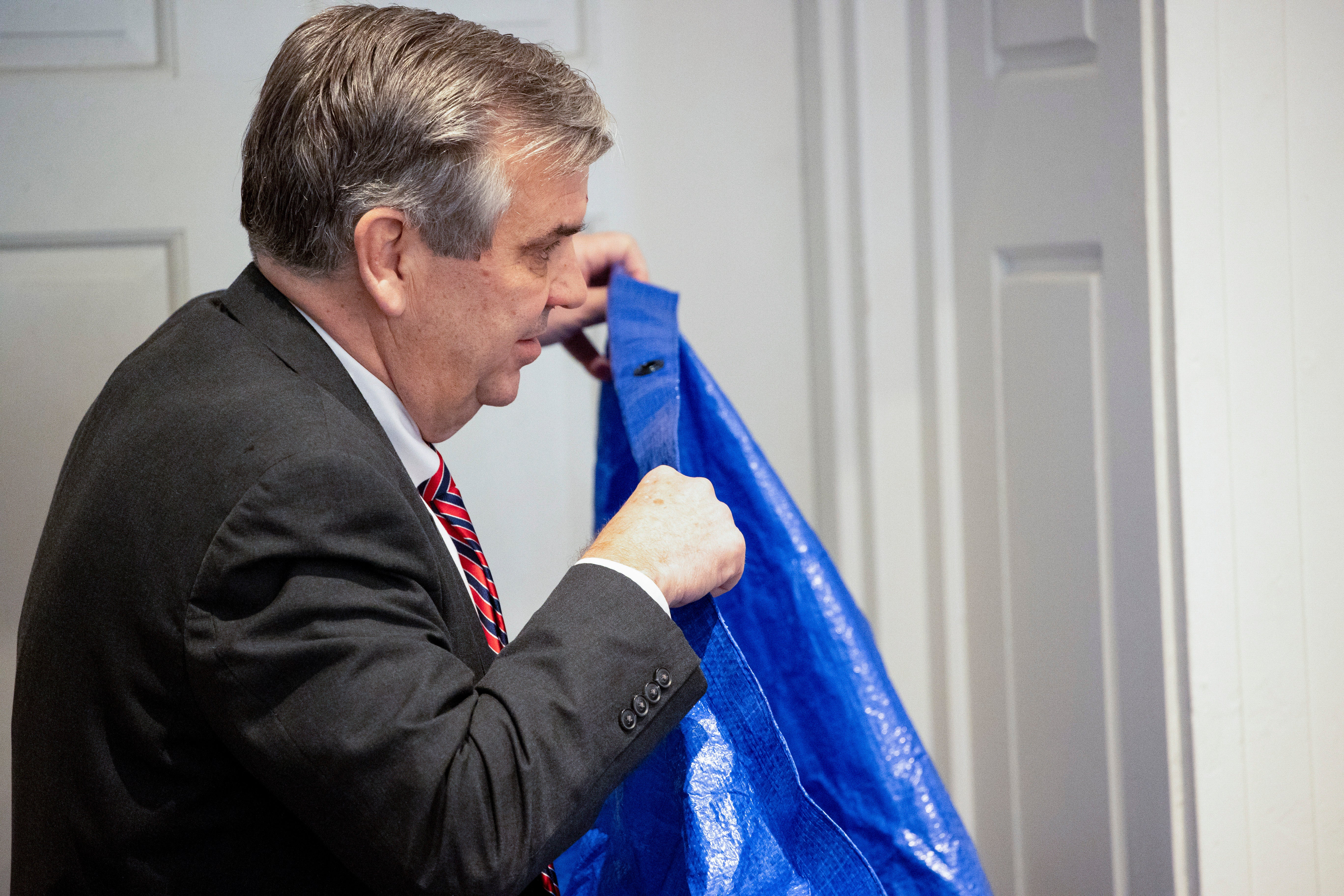
Mr Waters said that was the rainjacket bundled up.
The judge denied a motion from the defence to strike the raincoat as evidence.
Gunshot residue found all over blue raincoat
Gunshot residue was found all over the mystery blue raincoat that Murdaugh allegedly hid in his parents’ home in the days after the murders.
SLED forensic scientist Megan Fletcher testified that at least 38 gunshot residue (GSR) particles were found on the inside of the jacket – a “significant” number which would be consistent with a recently-fired gun being wrapped up inside the jacket.
She added that she “stopped counting” after reaching 38 but contended that she could have gone on to find more.
A smaller number was found on the outside.
The two firearms used to kill Maggie and Paul – an AR-15-style rifle and a shotgun – have never been found.
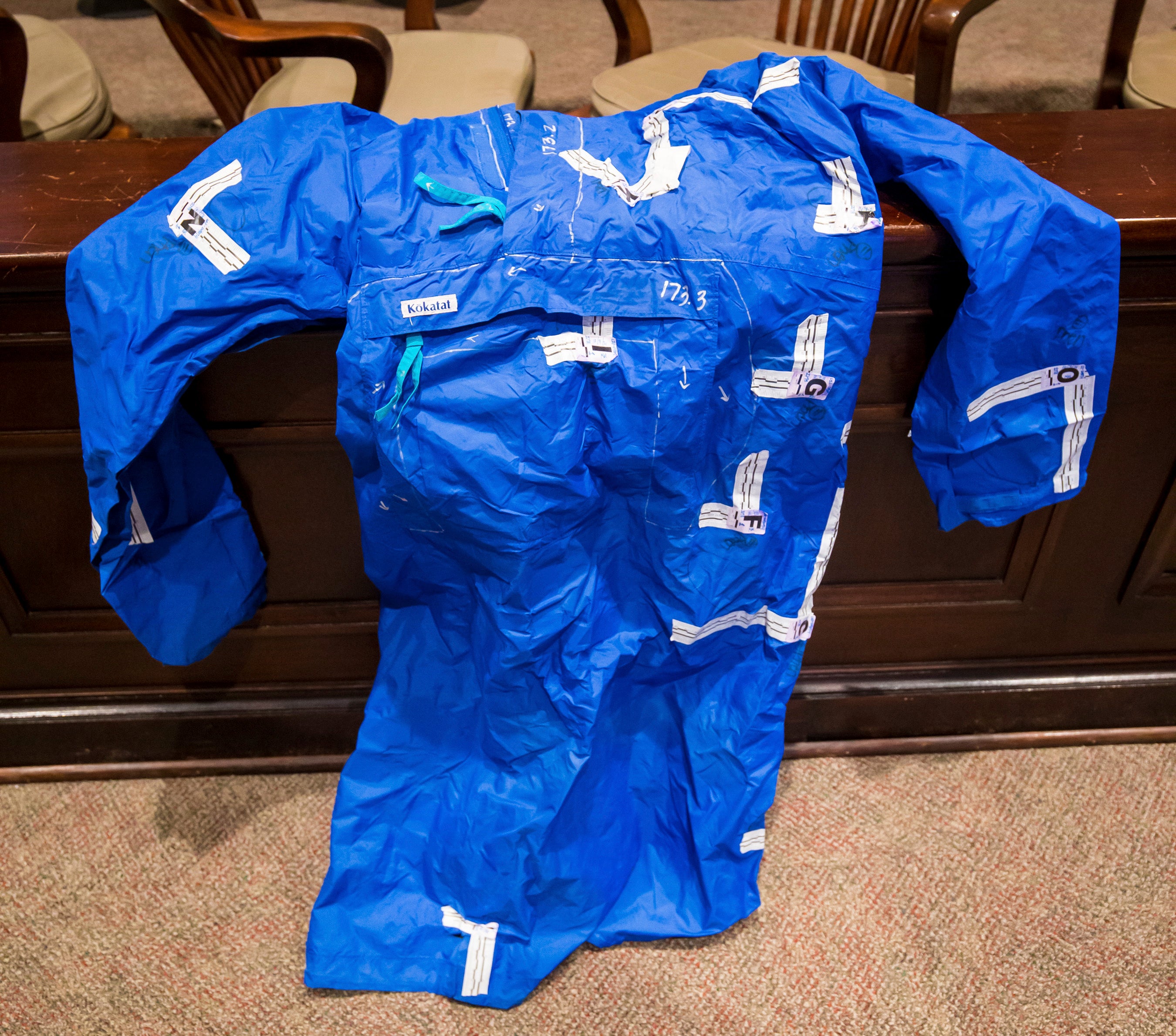
Murdaugh’s hands, his shirt and shorts and the seatbelt buckle of his car also had smaller numbers of GSR particles on them. On his shoes, no gunshot residue was found.
Friend testifies that Murdaugh lied to him about being at kennels
Ronnie Crosby, PMPED partner and Murdaugh’s friend of 25 years, revealed that the accused killer lied to him about going to the dog kennels that night, as he became the third state witness to say he is “100 per cent” sure that the voice captured in Paul’s cellphone video belongs toMurdaugh.
Mr Crosby testified that he rushed to Moselle as soon as he learned about the murders and stayed with Murdaugh until around 3.30am the following morning.
During that time, he had “multiple conversations” with his friend about his movements that night including where Murdaugh told him personally that he had never gone down to the kennels that night.
“That came up in one of the conversations, and he specifically said that he did not,” he testified.
Instead, Murdaugh gave him the same alibi story that he gave to law enforcement – that he was napping at the family home, woke up and drove to his parents’ home to visit his sick mother.
Mr Crosby also testified how he learned that Murdaugh had been stealing millions of dollars from PMPED clients – and how the probe into missing payments was put on hold because of the murders.
Car data suggests holes in alibi
Data taken from Murdaugh’s car has offered a potential timeline for his movements on the night of the murders – and suggests holes in the alibi he gave to his mother’s caregiver.
FBI electronics engineer Dwight Falkofske testified that he extracted data from the onboard computer system of Murdaugh’s 2021 Chevrolet Suburban, including call logs, contact lists, some location data and the “state” of the vehicle in terms of when it was turned on, when it was in and out of park mode, and when the doors were opened.
The data offers jurors a timeline for the vehicle’s movements – and therefore its driver Murdaugh’s movements – on the night of 7 June 2021 when his wife Maggie and son Paul were shot dead on the family’s 1,700-acre estate in Islandton.
The data indicates that Murdaugh did leave his family home and drove to visit his sick mother at around 9.06pm, arriving at 9.22pm.
However, it also indicates that he only stayed at his parents’ home for 21 minutes – and not the 30 to 40 minutes he told Ms Smith to tell authorities – leaving again at 9.43pm.
The records show him arriving at Moselle at around 10pm. He called 911 at 10.07pm.
Murdaugh’s rehab text revealed
Annette Griswold, who worked as a paralegal at PMPED, also revealed how she learned that he had been stealing money from the firm.
Days after his fraud scheme came to light and he was ousted from PMPED, Murdaugh checked into rehab.
Ms Griswold testified that she received a text from Murdaugh in late September 2021 apologising for what he had done. He also sent the text to another colleague.
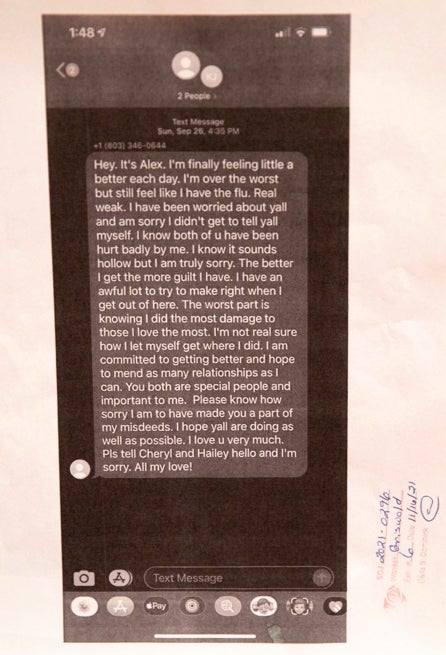
“Hey, it’s Alex. I’m finally feeling a little bit better each day,” the text message said.
“I’m over the worst but still feel like i have the flu. Real weak. I’m have been worried about y’all and I’m sorry I didn’t get to tell y’all myself. I know both of you have been hurt badly by me. I know it sounds hollow, but I am truly sorry.
“The better I get, the more guilt I have. I have an awful lot to try to make right when I get out of here. The worst part is knowing I did the most damage to those I love the most. I’m not sure how I let myself get where I did. I am committed to getting better and hope to mend as many relationships as I can.
“You both are special people and important to me. Please know how sorry I am to have made you part of my misdeeds. I hope you are doing as well as possible. I love you very much.”
Murdaugh text friend after time of murders
When he testified for a second time – this time in the presence of jurors – Mr Wilson told the court that he had spoken with Murdaugh on the night of Maggie and Paul’s murders.
Records show that Murdaugh called him at 9.11pm on the night of 7 June. He said he asked Mr Murdaugh if he could call him back in a bit as he was busy.
Murdaugh seemed normal at the time, he said.
Call records show Mr Wilson called him back at 9.20pm and Murdaugh said he was just getting to his mother’s house.
At 9.52pm, Murdaugh sent him a text saying: “Call me if you up”.
Mr Wilson said he called him right away. The first time there was no answer so he called a second time and Murdaugh answered and they had a brief chat about Murdaugh’s mother.
Prosecutors say that Murdaugh killed his wife and son at around 8.50pm.
Murdaugh asked housekeeper to clean home hours after murders
Murdaugh asked his housekeeper to clean the family home on the morning after the murders of his wife and son – and then tried to get their stories straight about what clothes he was wearing before the killings.
Blanca Simpson, who worked as the Murdaugh family housekeeper for several years, revealed that Murdaugh had asked her to come to Moselle on 8 June 2021 – hours after the murders – to make the house “the way Maggie liked”.
When she went to the house, she said she noticed several “very unusual” things including pots being in the fridge instead of on the stove or sink and Maggie’s pyjamas and underwear lying “neatly in the middle of the doorway” of the laundry room.
She said it was “very unusual”, saying: “It just didn’t look right to me” because Maggie “didn’t wear underwear with her pyjamas” and the “underwear appeared to be clean not dirty”.
In the shower room, she said she also noticed a light puddle of water, a towel and a pair of khaki pants. (On the morning of 7 June, she told the court she had seen Murdaugh wearing a pair of khaki pants.)
She testified that she then put the pants in the wash.
Ms Simpson also testified about the full outfit she saw Murdaugh wearing on the morning of the murders – the khaki pants, a seafoam polo shirt, a blue sports coat and some house shoes.
As the person who cleaned all the Murdaugh family’s clothing and the house, she revealed that she “never” saw the seafoam coloured shirt or the house shoes again after that day.
Murdaugh tried to get stories straight with housekeeper
Two months after the murders – in August 2021 – she testified that Murdaugh brought up what shirt he was wearing on the morning of the murders.
The two of them were at one of the Murdaugh’s properties and he said to her: “I need to talk to you, come here sit down.”
She did and Murdaugh, while pacing, said: “I got a bad feeling ... something’s not right.”
Murdaugh mentioned to her that “there’s a video” and said “you remember the Vinnie Vine shirt... I was wearing that shirt that day”, she testified.
Ms Simpson said that she believed he was trying to make sure that she told law enforcement the same story about he was wearing that fateful day.
Murdaugh insisted Maggie and Paul come home on night of murders
Jurors also heard about phone calls and text messages between Ms Simpson and Maggie – revealing that Murdaugh had insisted both Maggie and Paul come to the property at Moselle on the day of the murders.
Ms Simpson told the court that Maggie texted her saying: “Alex wants me to come home.”
Maggie liked being at the family beach house in Edisto and had been preparing to host a big July 4 gathering there, she said.
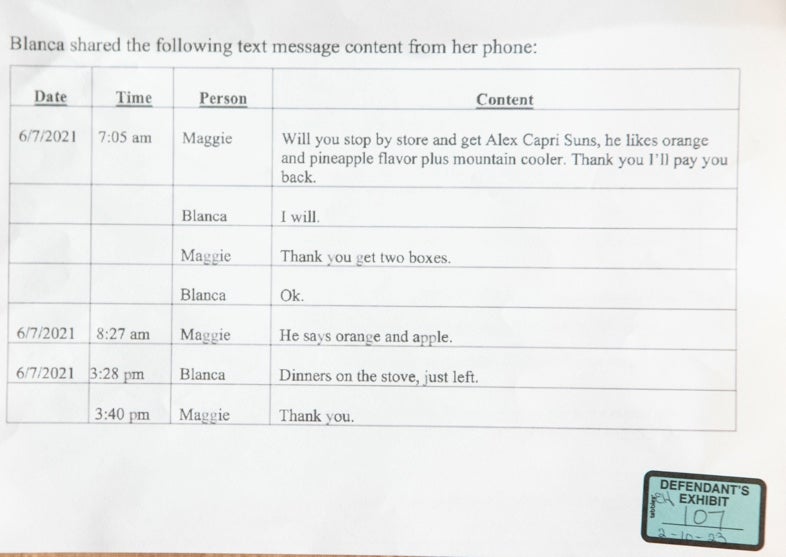
In a phone conversation, Maggie also mentioned that Murdaugh wanted her to come to Moselle that day and she seemed a bit “disappointed”, she said.
“She sounded like she didn’t want to come home... she sounded like she was a little disappointed,” she said.
Murdaugh had also asked Paul to come home too because he wanted his son to “fix” something on the property, Ms Simpson testified.
Maggie was concerned about money and husband’s truthfulness
Prior to her murder, Maggie had confided in Ms Simpson about concerns with the family’s finances – and concerns that Murdaugh was not being truthful with her about the extent of their situation, she said.
She said that Maggie had asked to speak to her and they went in a room in the home together where Maggie broke down crying.
“She was concerned about the amount of money they were requesting on the lawsuit – $30m is what she told me,” she said.
Maggie told her that she felt “Alex was not being truthful to her about the lawsuit... she said ‘he doesn’t tell me everything’,” testified Ms Simpson.
Under cross-examination, Ms Simpson told the court that she got the impression Murdaugh “adored” his wife.
However, Ms Simpson damningly became the fourth witness to identify Murdaugh as the voice in the video at the dog kennels moments before the murders.
No blood found on Murdaugh’s shirt
South Carolina Law Enforcement Division Agent Sara Zapata said that no blood was confirmed on the white shirt that Murdaugh was wearing on the night of the murders.
However the negative result could be due to some of the tests carried out. Preliminary tests had found probable blood stains.
Prior to the trial, reports said that blood spatter was found on Murdaugh’s clothing but prosecutors appear to have abandoned this argument.
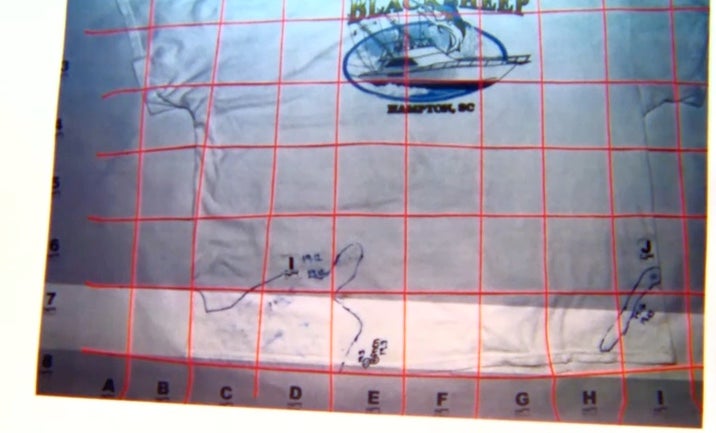
Instead, they are arguing he changed his clothing after the murders as he claimed to have moved the bodies, but no blood was found in the white t-shirt.
Blood was found on the steering wheel of Murdaugh’s SUV, jurors heard.
Paul was facing killer when he was shot, says pathologist
Forensic pathologist Dr Ellen Riemer testified about the extent of the injuries suffered by Maggie and Paul.
Dr Riemer, who performed the autopsies, revealed that Paul was likely standing with his face tilted towards his killer when he was shot.
The first bullet – to the chest – likely left him standing but the second bullet blew the inside of his head, leaving almost all his brain matter detached from his body.
Dr Reimer said that stippling was found on Paul’s chest wound, indicating the shot was fired from within three feet, but not closer than six inches. There was no soot, which would indicate a closer shot.
Maggie was also facing her killer when she was first shot, the expert said.
She first suffered a gunshot wound to her left breast, and the bullet travelled upward to the left side of her face. The second shot went through her kidney, which probably caused her to bend over and while in that position, she was shot in the chest and to the back of her head, Dr Riemer said.
Cameras in the courtroom were requested not to show the graphic autopsy pictures while Murdaugh wept in court.
Maggie’s sister says Murdaugh told her killer had planned murders ‘for long time’
Maggie’s sister Marian Proctor took the stand on 14 February where she revealed her brother-in-law’s odd comments in the aftermath of the murders.
She recalled one conversation where she said he reassured her that his wife and son did not suffer in their brutal murders.
“Now I don’t know that that’s true,” Ms Proctor told prosecutors through tears.
At a later time, she said she asked him if he had “any idea” who was responsible.
Her brother-in-law responded by telling her the killer had planned the murders “for a long time”.
“[He said] that he did not know who it was but that whoever did it had thought about it for a long time,” she said.
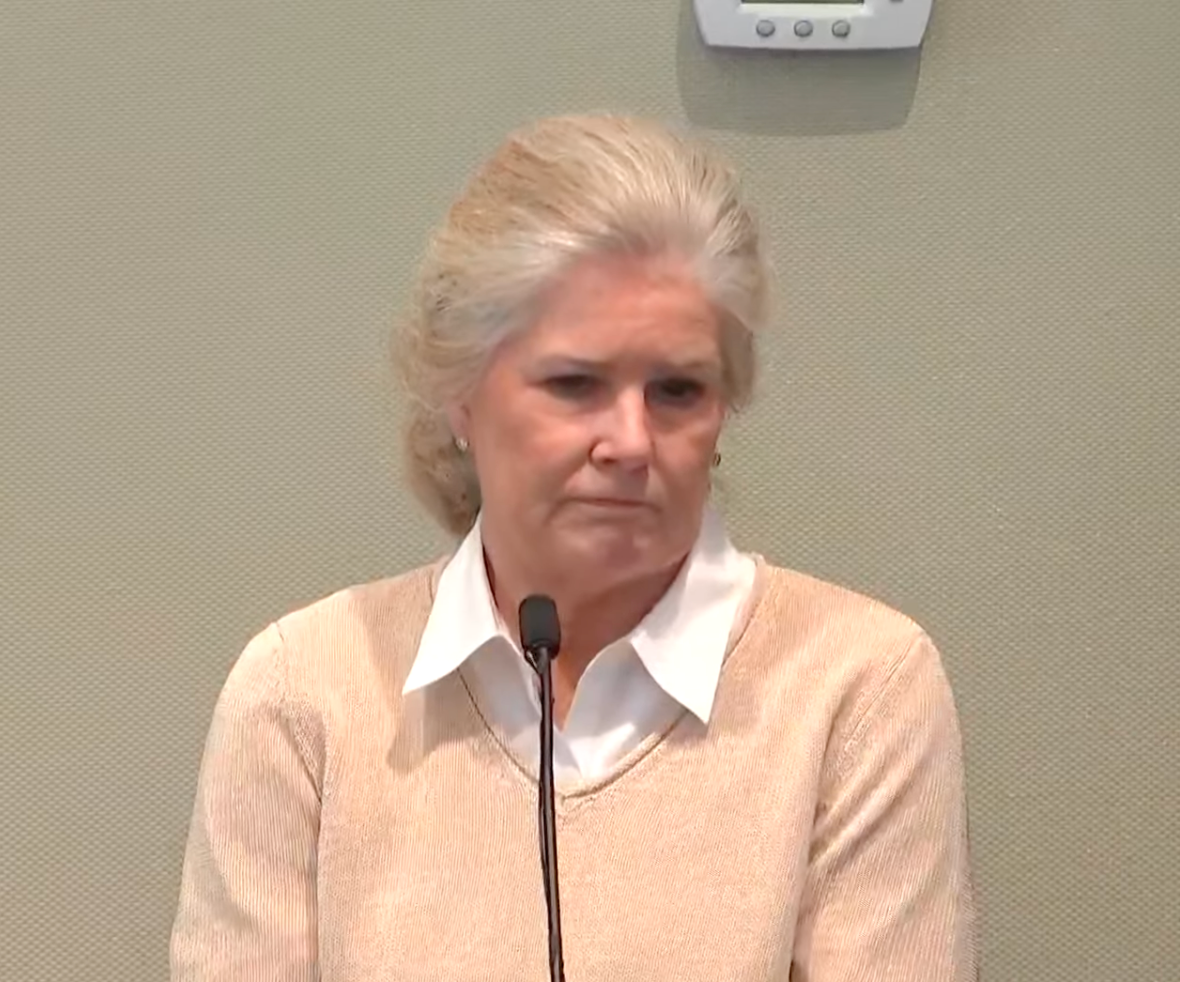
Ms Proctor said Murdaugh also seemed more eager to clear Paul’s name in the boat crash than he was about finding the killer.
“[Murdaugh] said that his number one goal was clearing Paul’s name. And I thought that was so strange because my number one goal was finding out who killed my sister and Paul ... I don’t know how he could have thought about anything else,” she said.
“We never talked about it. We never talked about finding the person, who could have done it. It was just odd. We were sort of living in fear because we thought this horrible person was out there,” Ms Proctor said.
“We were mostly afraid for Alex and Buster but we didn’t know the motive behind the killings. We thought it probably had something to do with the boat case. And we thought that up until September. And then things started to change a little bit.”
Sister-in-law reveals affair years before murders
Ms Procter also testified about a time when Maggie discovered her husband was having an affair.
In the absence of the jury, Ms Proctor claimed that although the affair had happened 15 years ago and they were able to work through it, it was still a sore point in the marriage and Maggie had brought up again around the time of the murders.
“She did not think anyone was still going on, it just bothered her,” Ms Proctor said, also saying that Maggie made her husband leave the house years ago when she first became suspicious.
The defence denied the affair and asked the judge to disregard the testimony – something the judge agreed to.
Mr Murdaugh’s sister-in-law also revealed, in the presence of the jury, that the family knew about his opioid abuse.
Maggie even nicknamed Paul the “Little Detective” as he kept an eye on his father’s behaviour and opioid use.
Dog caretaker reveals unusual state of kennels
Dale Davis, who cared for the Murdaugh’s dogs at the kennels, said that puddles of water were not where they should have been, the hose had clearly been used and the dogs were in the wrong kennels when police arrived on the scene of the murders.
Prosecutors have suggested that Murdaugh cleaned up himself and the crime scene after the murders before building an alibi for that night.
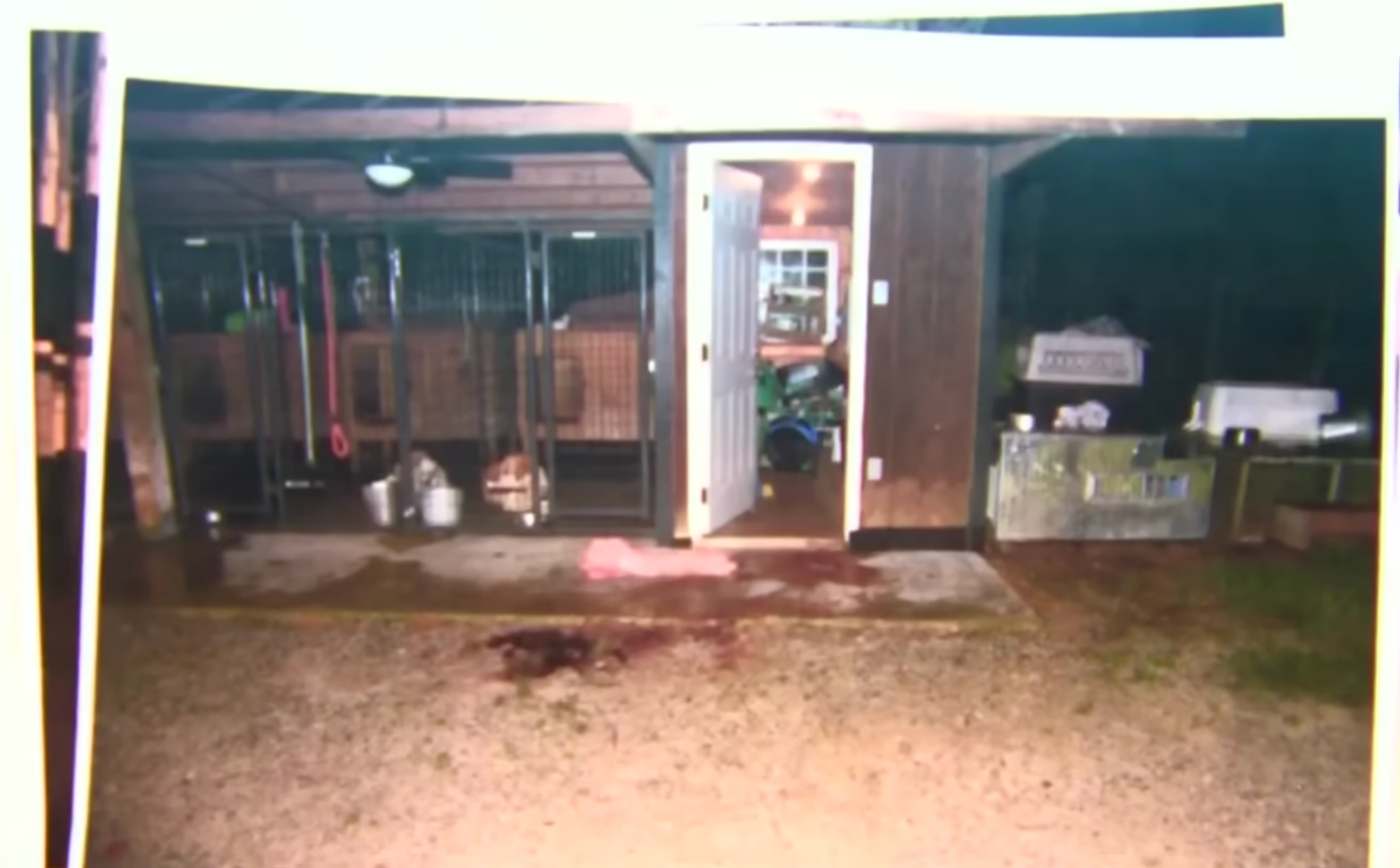
Under cross examination, Mr Davis confirmed that the hose was already in a different position to where he had left it in the cellphone video captured by Paul.
He also recounted a time when Murdaugh couldn’t bring himself to put down a dog.
Police interview footage reveals wild inconsistencies in alibi
Footage from an 11 August 2021 police interview with Murdaugh was played in court.
In the interview, which has never been seen before, SLED Special Agent David Owen confronted Murdaugh about wild inconsistencies in his alibi in a police interview two months on from the murders.
Among the inconsistencies were: how long Murdaugh spent at his mother’s home that night; whether or not he went to the dog kennels; the different clothes he was wearing; the timeline of when he was at his law firm; and the reason Maggie had gone to the family estate that day.
Murdaugh denied that his voice is in Paul’s cellphone video – something multiple witnesses have testified is Murdaugh.
The police interview also revealed Murdaugh claiming he had spent 45 minutes to an hour at his sick mother’s house that night – a timeline that has been refuted by both car data and testimony from his mother’s carer.
The accused killer also claimed that he wasn’t expecting his wife home but later learned she had come to the property because she was worried about him. Ms Simpson testified he had told Maggie and Paul to come to the home that night.
“It wasn’t one inconsistency. It was several inconsistencies within a period of time that were repeated,” Agent Owen testified in court, adding that Murdaugh was “the only known suspect at that time”.
The footage also showed Murdaugh’s apparent lack of surprise when he was told for the first time that his wife and son had been murdered by the family’s own guns.
Video shows moment police ask Murdaugh if he killed wife and son
Near the end of the police interview, the agent is seen telling Murdaugh that he has “a few more questions”.
Then, in a bombshell moment, the officer asked Murdaugh for the first time if he had killed his wife and son.
“Did you kill Maggie?” he asked.
Murdaugh replied: “No... Did I kill my wife? No, David.” When the agent asked if he knows who did, Murdaugh said: “No, I do not know who did.”
“Did you kill Paul?” Agent Owen continued.
“No, I did not kill Paul,” Murdaugh said.
Agent Owen said he had “to go where the evidence and the facts take me” as he told him: “I don’t have anything that points to anybody else at this time”.
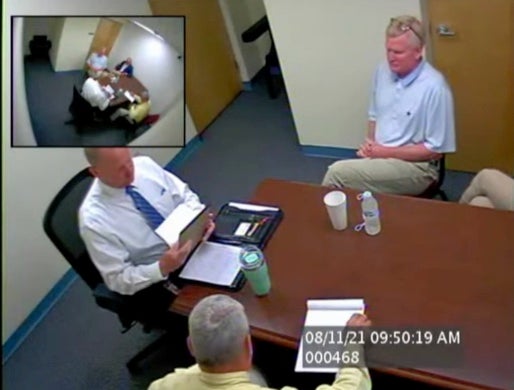
At that moment, Murdaugh realised for the first time that he was the prime suspect in the case.
“So does that mean that I am a suspect?” Murdaugh asked.
Murdaugh spent $50,000 a week on drugs
Murdaugh spent a staggering $50,000 a week on drugs which he was buying from Curtis Edward Smith, defence attorney Jim Griffin told the court.
During cross-examination of Agent Owen, Mr Griffin claimed that Mr Smith – Murdaugh’s alleged drug dealer, distant cousin, former law firm client and accused co-conspirator in a bizarre September 2021 botched hitman plot – in turn owed money to a local “cowboys gang,” said Mr Griffin.
The defence attorney grilled Agent Owen about why the members of this unidentified gang were never treated as suspects and why their DNA was not tested against evidence taken from the crime scene.
The special agent testified earlier that, by August 2021, Murdaugh was the one and only suspect in the brutal slayings.
The cross-examination somewhat backfired, as it led the judge to reverse a ruling, allowing jurors to hear testimony about the botched hitman plot – and potentially from Mr Smith, infamously known as “Cousin Eddie”, himself.
On 4 September 2021 – three months on from the murders – the disgraced attorney was ambushed in what he initially claimed was a drive-by shooting along a road in Hampton County. He checked into rehab the following day, announcing that he was struggling with a 20-year opioid addiction and that he had resigned from his law firm PMPED.
But, Murdaugh’s story about the roadside shooting soon unravelled and he confessed to law enforcement that he had orchestrated the saga, paying Mr Smith to shoot and kill him in an assisted suicide plot so that his surviving son Buster could get a $10m life insurance windfall.
Both Mr Smith and Murdaugh were then arrested and charged over the incident.
Killer allegedly ambushed Paul and shot Maggie on knees as she fled
Dr Kenny Kinsey, an Orangeburg County sheriff’s deputy and crime scene expert, gave graphic testimony walking jurors through the victims’ final terrifying moments including each of the gunshots they suffered and where the gunman stood while firing each shot.
He revealed that the killer ambushed Paul in the feeding room of the dog kennels leaving him with no time to defend himself.
The first shot, which struck Paul in the chest and arm, was not fatal.

The 22-year-old remained standing for several moments and then moved “slowly” towards the door of the feeding room – and towards his killer. As he reached the door frame, he was shot a second time in the shoulder and brain and fell forward landing outside the feeding room.
After killing Paul, the gunman then left the feeding room area and approached Maggie outside.
In her final terrifying moments, she faced her killer and backed away, knocking into the family’s ATV before being gunned down by her killer.
She was struck twice before falling to her knees, at which point the killer shot her twice in the head.
Jurors were shown a photo of a tire impression on the back of Maggie’s calf – which the expert said was from the tire of the ATV under the hanger next to Maggie’s body.
Moment Murdaugh confessed to botched hitman plot
Following the judge’s reversal of a ruling, jurors finally heard evidence of the botched hitman plot as SLED Senior Special Agent Ryan Kelly was called to the stand.
Jurors heard Murdaugh claim – first in the 911 call and then in a police interview in hospital – he was ambushed in a drive-by shooting by a “nice-looking” white male, aged 30-40 with facial hair and close-cropped hair.
Mr Kelly testified about how a sketch artist was called in to help capture Murdaugh’s description of the non-existent man, with the sketch being presented in court.
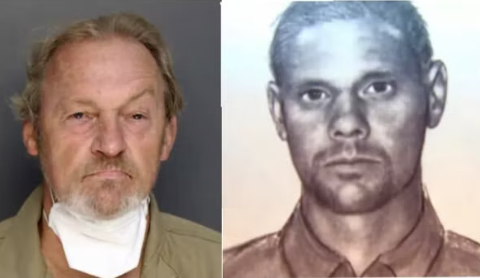
Jurors then heard audio of a call Murdaugh and his lawyers made to Agent Kelly on 13 September 2021 – nine days after the shooting – where he confessed to orchestrating the entire plot with Mr Smith.
In the call, which had never been heard before, Murdaugh told the agent he had believed his family would be “better off without him” because he knew his ousting from his law firm and his string of financial crimes were about to come out.
“I was in a very bad place,” he said. “I thought it would be better for me not to be here anymore. I thought that it would make it easier on my family for me to be dead.”
He insisted that he did not pay Mr Smith to kill him, something the agent told him “doesn’t make any sense to me”.
In the audio he also admitted he had spent up to $60,000 a week buying drugs from Mr Smith – using “ill gotten” money – but dismissed any connection between his drug abuse and the murders of Maggie and Paul.
Prosecutors claim that the roadside shooting saga was part of Murdaugh’s pattern of creating violence to get away with things – with the shooting coming just one day after he was confronted by PMPED for stealing millions from clients.
Car data places Murdaugh at spot where Maggie’s phone was dumped
Newly-obtained car data has placed Murdaugh at the spot where his wife’s phone was later found dumped – before he quickly sped away from the scene.
General Motors had contacted law enforcement to hand over a trove of data from Murdaugh’s 2021 Chevy Suburban, including never-before-seen speed and GPS data, days after an agent testified about data from the car.
It shows the disgraced legal dynasty heir left the family home in his 2021 Chevy Suburban at 9.07pm on the night of 7 June 2021 – just minutes after he allegedly shot and killed Maggie and Paul.
One minute later, while driving at a speed of 42 mph, his car passed the very spot along Moselle road where Maggie’s cellphone was recovered from the shrubbery the next day.
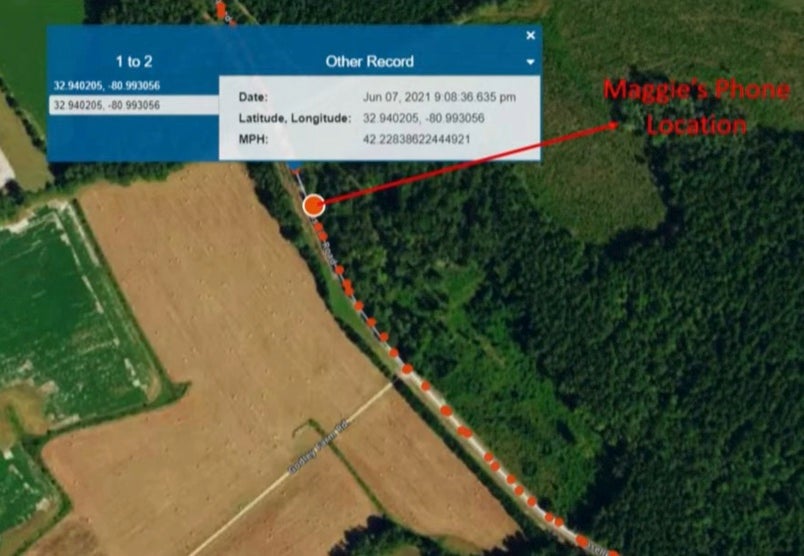
After passing that spot, his car then picked up speed, reaching 52mph just one minute later at 9.09pm and continuing to go at a high speed all the way to his mother’s house.
“After passing that location, the defendant’s vehicle accelerates,” SLED Agent Peter Rudofski testified.
Just 17 seconds passed between arrival at kennels and 911 call
In another bombshell moment, the data revealed that less than 20 seconds passed between the moment Murdaugh’s car arrived at the dog kennels and the start of his 911 call where he claimed he found Maggie and Paul’s bodies.
During the 911 call – and in interviews Murdaugh gave in the aftermath of the murders – he claimed he had touched both his wife and son’s bodies to check for signs of life before calling 911.
He also claimed that when he moved Paul, his cellphone “popped out of his pocket”. He said he picked it up but then put it back down on his son.
The data shows that Murdaugh’s car arrived at the kennels at 10.05.57pm, he said.
Murdaugh made the 911 call 10.06.14pm – just 17 seconds after his car pulled into the kennels.
The data also showed a drastic change in speed from Murdaugh’s driving on the day of the murders – to his driving to and from his mother’s house in the aftermath.
Maggie and Paul found ‘bags of pills’ month before murders
A bombshell voicemail message has revealed that Maggie and son Paul found “bags of pills” in the accused killer’s bag just one month before their murders.
The message, on 6 May 2021, shows Paul confronting his father about the discovery of the drugs – at a time when the disgraced attorney claims he was spending up to $60,000 a week to feed a 20-year opioid addiction.
“I am still in EB because when you get here we have to talk. Mom found several bags of pills in your computer bag,” it says, referring to Edisto Beach, the Murdaugh family’s beach home.
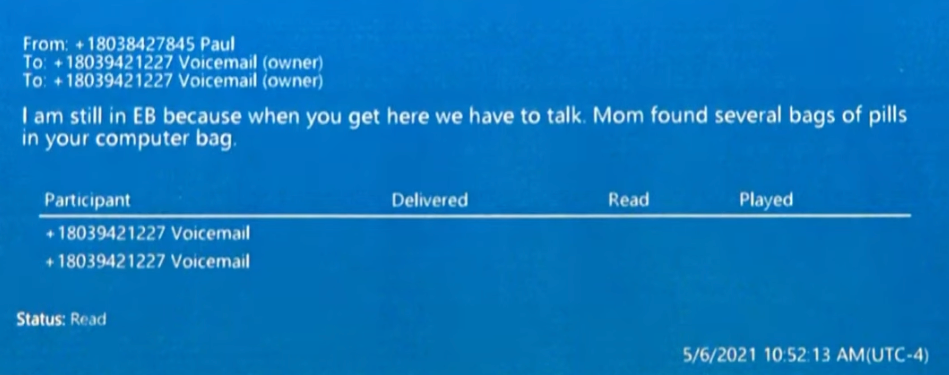
It is not clear whether Murdaugh responded to the message left by his son or if the family members confronted him about the drugs in person.
Days later on 26 May 2021 – 12 days prior to her murder – Maggie then carried out several internet searches seeking to identify different types of pills.
Then, on 3 June 2021 – four days before he allegedly killed his wife and son – Murdaugh sent a voicemail to then-Palmetto State Bank CEO Russell Laffitte asking him for money.
“I need to extend farm credit line another 600k. My dad will sign also if needed. How much turnaround will that take?” he asked.
Buster says his father was ‘destroyed’ by murders
Murdaugh’s surviving son Buster took the stand in his father’s defence for the murders of his mother and brother.
The 26-year-old said that his father had been “destroyed” and “heartbroken” after the murders.
In what marks the first time he has ever spoken out publicly about the murders, he recounted the moment that he learned that his mother and brother were dead.
Buster said that Murdaugh called him that night and asked him if he was sitting down.
“He sounded odd and then he told me that my mom and brother were shot,” he recalled.
He headed to the family home and found his father “heartbroken” and barely able to speak.
“He was destroyed, he was heartbroken. I walked in the door and saw him and gave him a hug... just broke down,” he said.
During calm, controlled testimony, Buster appeared to water down – but not refute – some key points in the prosecution’s case, including his father’s behaviour on the day of the murders, the clothes he was wearing and the police interview where he appeared to unwittingly confess to killing his wife and son.
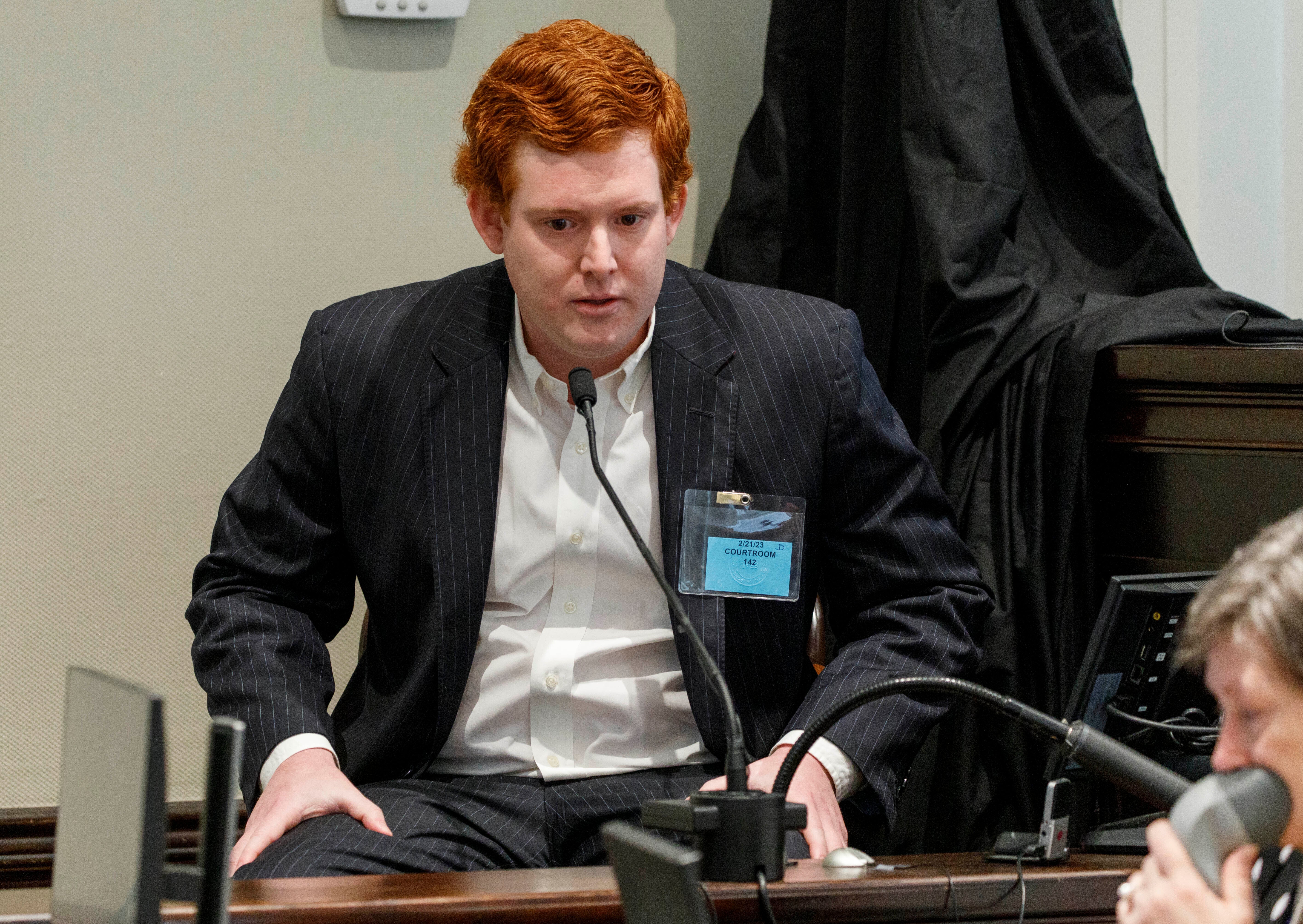
Defence witness claims shooter is 5’2”
Mike Sutton, a forensic engineer who specialises in external ballistics, took the witness stand for the defence and suggested that Maggie was gunned down by a 5’2” shooter.
Based on the projection of one of the bullets at the crime scene, Mr Sutton told the court that he believes the assailant who shot Maggie with an AR-15-style rifle had to be 5’2” to 5’4”.
Murdaugh is 6’4” tall.
“In my opinion, it’s very unlikely that he fired that shot,” he testified.
“You would have to be bending over and have your shooting hand down at or below your kneecap. It just makes it very unlikely that a tall person made that shot.”
Jurors were shown 3D animations of the area around the dog kennels and images of anonymous shooters.
During a tense cross-examination, the prosecution sought to cast doubts on Mr Sutton’s credibility – questioning his lack of training and gunshot expertise, mockingly referring to the defence’s alleged assailant as an 11 or 12-year-old child and suggesting his testimony was little more than “guesswork”.
‘Baseball-sized’ piece of Paul’s skull left at crime scene
Jurors heard that a piece of his son’s skull “the size of a baseball” was left behind at the crime scene by South Carolina investigators.
Murdaugh’s former law firm partner at PMPED Mark Ball described a chaotic crime scene on both the night of the murders and the next day – with evidence left out in the elements or left behind altogether.
Mr Ball, who knew Murdaugh for three decades and was close to the family, said that SLED had released the crime scene back to the Murdaugh family by the morning of 8 June 2021 – just hours on from the murders.
He said he went down to the dog kennels of the family’s Moselle estate in Islandton and made a grim discovery.
“A piece of Paul’s skull the size of a baseball was there,” he said.
“It really infuriated me,” he said, adding that “it was still a pretty raw scene”.
The defence’s case has repeatedly sought to cast doubts on the preservation and collection of evidence from the crime scene – indicating that the investigation into the murders may have been botched from the get go.
On the night of the murders, Mr Ball testified that the area wasn’t taped off and law enforcement officials, friends and family were walking all over the crime scene.
The defence witness appeared to do a favour for the prosecution when he said he now has “no doubt” that the third voice in the kennel video is Murdaugh’s.
He said that he had not seen the kennel video until about a month a go but, now that he has, he knows his friend lied to him about not being at the scene that night.
Murdaugh confesses to lying about alibi on night of murders
In a dramatic day in court on 23 February, Murdaugh took the stand in his own murder trial and confessed that he had lied about his alibi on the night of the murders.
At the start of testimoy, the disgraced attorney admitted that he had lied about not going to the dog kennels with Maggie and Paul on the night of 7 June 2021.
He blamed his opioids addiction for giving him “paranoid thinking” and his distrust of SLED which together led him to lie to law enforcement agents, family members and friends on multiple occasions and for the past 20 months.
“On June 7, I wasn’t thinking clearly. I don’t think I was capable of reason. And I lied about being down there. And I’m so sorry that I did,” he said, his eyes brimming up with tears.
“Oh what a tangled web we weave. Once I told the lie, and I told my family, I had to keep lying,” he testified.
This is the first time that Murdaugh has ever confessed publicly or to law enforcement that he had lied.
This confession comes after jurors have seen Paul’s damning cellphone video which places him at the scene of the murders – with multiple witnesses identifying his voice in the footage.
Murdaugh sobs as he describes finding murder scene – and insists innocence
While confessing to lying, he continued to insist his innocence of the murders.
“I did not shoot my wife or my son any time, ever,” he told his attorney Mr Griffin.
Murdaugh spoke fondly of his wife and son – who he repeatedly referred to as “Paw Paw” – as he faced jurors head on and broke down in tears on multiple occasions.
“My boy was lying face down... I could see his brain laying on the sidewalk. I didn’t know what to do,” he said of Paul’s body.
He dismissed the significance key parts of the prosecution’s case – such as his change in clothing and his alleged attempts to get his story straight with his mother’s carer and his housekeeper.
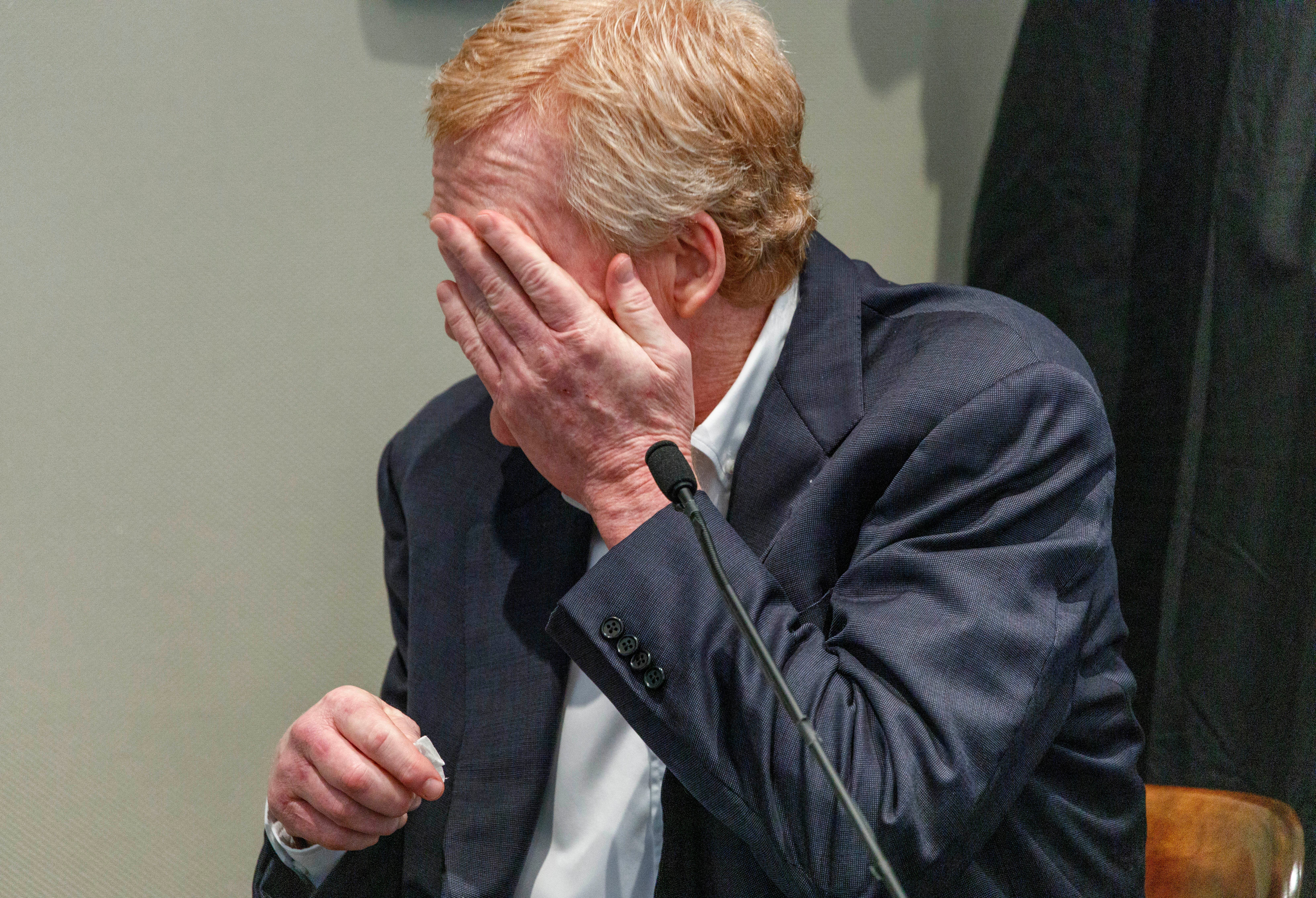
Murdaugh confesses to financial crimes and roadside shooting
Murdaugh also confessed to stealing money from his law firm and to orchestrating a bizarre botched hitman plot – but continued to deny killing his wife and son.
Murdaugh blamed his alleged financial crimes on a 20-year opioid addiction, which he said he had spent years battling.
“I’m not quite sure how it got the way it got but I was battling addiction for so many years. I was spending so much money on pills,” he said.
He claimed that he developed his addiction after injuring his knee in college, and his addiction just escalated after that.
When asked how long he had been clean of drugs, he smiled at the jury and said: “535 days and “I’m very proud of that.”
In a move that sought to undermine the prosecution’s theory of a motive, Murdaugh insisted that he was not concerned that his financial crimes were on the brink of exposure on the day of the murders.
His law firm was asking questions about missing payments – with his CFO confronting him about $792,000 on the day of the murders – and a hearing in the 2019 fatal boat crash lawsuit was scheduled for that week.
He also sought to dismiss the significance of a voicemail message he sent to former Palmetto State Bank CEO Russell Laffitte four days before the murders – and suggested that the deaths of Maggie and Paul could not have benefited him financially.
Murdaugh insisted that there was $7m equity in Moselle home and that the home was fully in Maggie’s name.
“The entire Moselle property was 100 percent in Maggie’s name,” he said, so her death actually made it more difficult to access his finances.
On the botched hitman plot, Murdaugh told the court that believed it would be better for him to be dead.
“I knew all this was coming to a head. I knew how humiliating it would be for my son... I’d been through so much,” he said.
“At the time... I thought it was the better thing to do.”
Murdaugh accused of wearing solicitor to try to influence boat crash victims
Murdaugh snapped during a tense cross-examination about his family’s prominence in the low country, his alleged abuse of power, and the string of legal clients who he stole millions of dollars from.
The disgraced legal dynasty heir was confronted by prosecutor Creighton Waters on Thursday, who reeled off a list of “real people” who had suffered extensive injuries or losses – and were then swindled by the now-disbarred attorney.
In one case, Murdaugh stole $6m from Hakeem Pinckney, a man who became a quadruplegic after a car crash.
The cross grew increasingly heated as Mr Waters delved into the financial crimes with Murdaugh repeatedly returning to what the prosecutor said was a rehearsed line.
“How many times did you practice that answer before your testimony today?” he asked.
Murdaugh fired back: “I’ve never practiced that answer.”
He also sparred with the prosecutor over the prominence of the Murdaugh family in Hampton County with Murdaugh admitting that people likely saw him as a successful lawyer and that he and his family were prominent in the local legal circles.
They had “a lot of friends in law enforcement,” he said.
He also admitted that he “may” have used his solicitor’s badge to curry favour with law enforcement – including on the night of the boat crash.
The court was shown a surveillance image of Murdaugh at the hospital where the other teenagers were taken. He is wearing his soliticor’s badge hanging out of his pocket in the image.
Murdaugh denied telling the survivors not to cooperate with law enforcement and said he wasn’t sure why he had his badge on him – but “may” have done so to get a “warmer” response from police.
“I never told anybody not to cooperate with law enforcement,” he insisted.
“Did I pull my badge out when I went in the room with those kids? I know I did not do that.”
The jury also learned how he fitted blue police lights in his vehicle – even though he was never a member of law enforcement.
Murdaugh can’t remember last conversation with wife and son
During a testy cross-examination on 24 February, Murdaugh claimed he can’t remember the last conversation he ever had with his wife Maggie and son Paul – just minutes before they were gunned down on the family’s hunting estate.
The disgraced attorney was confronted by Mr Waters about his “new story” where he admits to being at the kennels with his wife and son.
When asked what he did at the kennels, he said that he was “talking to Mags”.
Yet, he was unable to recall what their final conversation was about.
“I don’t remember the exact details of what we talked about,” he said.
Under further prompting from the prosecutor, Murdaugh said that Maggie was “very concerned” about Paul and so he believes they may have spoken about that. He also said he believes he spoke to Paul was not sure what about.
Murdaugh is accused of changing alibi to fit evidence
The testy exchange came as Mr Waters confronted the accused killer about his “new story” about being at the dog kennels – which came after 20 months of lying to officials, friends and family members.
The prosecutor pointed out that this confession only came after jurors saw Paul’s damning cellphone video which places him at the scene of the murders with his wife and son at 8.44pm and after multiple witnesses had identified his voice in the footage.
“You, like you have done so many times in your life, had to back up and make a new story to fit with the facts of your life,” Mr Waters said.
Murdaugh denied this and instead sought to blame the prosecution for his lies rumbling on until his trial testimony, claiming that he tried to tell the truth – but that the state would not speak to him.
In a dramatic moment – laced with objections from the defence – Mr Waters pointed out that Murdaugh’s own attorneys were not apparently aware of his change in story either.
Jurors heard how – at a time when Murdaugh claims he wanted to come clean – his attorneys did a national TV interview in November last year “repeating your own lies” about his alibi.
Murdaugh: No one else at kennels that night
In another bombshell comment, Murdaugh insisted that there was no one else in the vicinity of the kennels when he was there – or the family’s dogs would have reacted.
“There was nobody around that the dogs didn’t know,” he said.
Pressed about the specific time that he left, Murdaugh estimated that he likely left around 8.47pm.
With the drive back up to the house in the golf cart taking a couple of minutes, Mr Waters pointed out that he would have got there at around 8.49pm.
Data indicates that Maggie and Paul last used their cellphones at 8.49pm and were shot dead around 8.50pm.
Murdaugh testified that he didn’t hear any gunshots after arriving back at the house.
The accused killer was grilled about his cellphone data which did not record any steps between 8.09pm and 9.02pm.
Murdaugh claimed he must have left his phone at the house while at the kennels – though he claims to have been back for aroudn 12 minutes by that point.
In a four-minute period between 9.02 and 9.06pm, Murdaugh’s cellphone then recorded 283 steps – movement Murdaugh struggled to explain other than saying he was “getting ready” to go to his mother’s home.
Murdaugh’s timeline of touching bodies disputed
Murdaugh was grilled about discrepancies around when he allegedly touched the bloody bodies of his wife and son.
In direct questioning, Murdaugh again claimed to touch both vicitms – but appeared to change the timing, saying he did it while on the phone to the 911 dispatcher.
Mr Waters confronted him about this saying that he had repeatedly told law enforcement that he had touched both Maggie and Paul prior to the 911 call.
“I know I checked them but I don’t think I checked them before calling 911,” Murdaugh said.
In the 911 call, Murdaugh does say he has “already” touched them but it is unclear if this was earlier in the call or prior to the call being placed.
However, Mr Waters suggested that this was another attempt by Murdaugh to amend his story to try to fit the irrefutable evidence.
Data from the accused killer’s SUV has previously revealed that less than 20 seconds passed between his car arriving at the scene and him placing the 911 call – a brief time that casts doubt on him touching the bodies beforehand.
Murdaugh claims boat wreck is motive for murders
Murdaugh has claimed that he still believes his wife and son were murdered by unknown assailants because of the 2019 fatal boat wreck.
“The social media response that came from that was vile. The things that were said about what they would do to PawPaw, they were so over the top,” he said.
“I believed then and I believe today that the wrong person saw and read that because – I can tell you for a fact that the person or people who did what I saw on June 7 – they hated Paul Murdaugh and they had anger in their heart.”
Breaking down in tears again, he said: “And that is the only, only reason that somebody could be mad at PawPaw like that and hate him like that.”

Prosecutor Creighton Waters scoffed at Murdaugh’s theory of a “random vigilante” acting over the boat wreck – bringing up the defence’s previous theory that the shooter was just 5’2”.
He also pointed out that there was no evidence to support the accused killer’s theory.
“So what you’re telling this jury is it’s a random vigilante, the 12 year-old 5’2” people that just happen to know that Paul and Maggie were both at Moselle on June 7, that knew they’d be at the kennels alone on June 7, knew that you would not be there but only between the times of 8.49pm and 9.02pm,” he said.
“That they show up without a weapon assuming they’re going to find weapons and ammunition there. That they commit this crime during that short time window and then they travel the same exact route that you do around the same time to Almeda?”
Murdaugh accused of lying on stand – about reason for alibi
After an hours-long cross, a bombshell moment unfolded when Murdaugh was accused of lying on the stand – about why he had lied over his alibi on the night of the murders.
Murdaugh had testified that he had lied for the past 20 months because he was “paranoid” over his suspicions of SLED, warnings from his law firm partners about always have a lawyer present when speaking to the police and investigators having swabbed his hands for gunshot residue.
But, in a dramatic moment, Mr Waters poured cold water on this testimony as he played a clip from bodycam footage from the first officer to respond to the scene.
In the video, Colleton County Sheriff’s Sgt Daniel Greene asked Murdaugh when he last saw Maggie and Paul.
“It was earlier tonight. I don’t know the exact time,” he said.
“I was probably gone about an hour and a half to my mom’s and I saw them about 45 minutes before that.”
Mr Waters pointed out that none of the factors Murdaugh claimed prompted his “paranoid” fuelled lies were present at that time.
“But you still told the same lie,” Mr Waters confronted him. “And all those reasons you just gave this jury about the most important part of your testimony was a lie, too. Isn’t that true, Mr Murdaugh?”
Murdaugh responded: “I disagree with that.”
The prosecutor said he had “nothing further” leaving Mr Murdaugh, looking somewhat dejected and defeated by what had just taken place.
Defence witnesses say Paul was shot in head at point blank range
Two defence experts gave gruesome testimony detailing how Paul was shot in the back of the head at point blank range.
Forensic pathologist Dr Jonathan Eisenstat and crime scene analyst Tim Palmbach were called as witnesses for Murdaugh’s defence team, where they both cast doubts on the prosecution’s theory of how the murders unfolded.
Both experts testified that the killer held a shotgun to the back of Paul’s head and pulled the trigger, with the force causing the 22-year-old’s brain to “explode” out of his skull.
“This explosive nature… you never see that unless you have a high-energy source contact wound,” testified Mr Palmbach.
The crime scene analyst and expert in blood spatter analysis said that “seeing that head in the position it was, that is a contact wound from an high energy source weapon” like a shotgun.
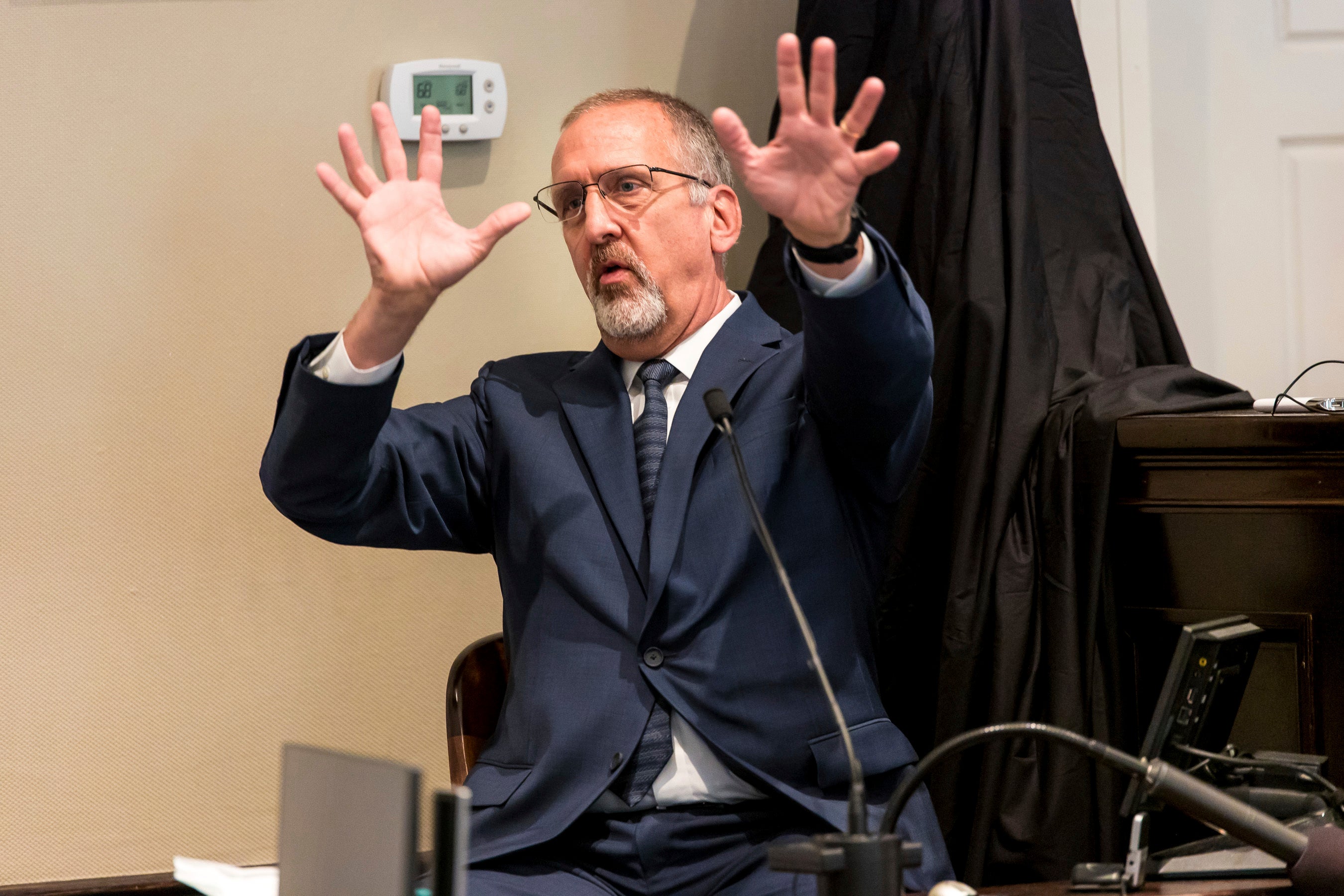
Because the shot was fired at point blank range – meaning the killer would also have had to be close to the 22-year-old when they pulled the trigger – the assailant would have been covered in the victim’s blood and other bodily substances, he said.
The contact wound theory disputes the testimony of Dr Ellen Riemer who performed autopsies on the bodies of the two victims. Dr Reimer said that the shooter fired from outside the feed room and the second, fatal shot had entered his shoulder and neck first, before travelling up to Paul’s brain.
On Maggie’s wounds, Dr Eisenstat testified that he believes one of the five shots travelled in the opposite way to Dr Reimer. He testified that the killer fired a bullet down into Maggie’s head as she leaned forward while facing her killer. The bullet then travelled into her chest, he said.
Mr Palmbach also testified that – based on the evidence – it was likely that there were two shooters.
Murdaugh’s brother describes cleaning up ‘what was left of Paul’
Murdaugh’s younger brother broke down in tears as he revealed how he cleaned up “what was left” of his nephew Paul the morning after the gruesome murders.
John Marvin Murdaugh, the youngest of the Murdaugh siblings, became the final witness in the defence’s case, telling jurors how he cleaned up his nephew’s “blood, brain matter and skull fragments” from the crime scene the morning after the murders.
John Marvin – who told jurors he had always had a “very special relationship” with the 22-year-old victim – said he had gone down to the dog kennels on 8 June 2021 and could see Paul’s blood, brain matter and pieces of his skull left all over the feed room.
By then – just hours on from the murders – SLED had already released the scene back to the Murdaugh family.
“It had not been cleaned up. I saw blood, I saw brains, I saw pieces of skull... I don’t know what I was seeing,” he said.
John Marvin testified that he set to work cleaning up “what was left of Paul” while he cried “incontrollably”.
“I promise you no mother, father, aunt or uncle should ever have to see and do what I did that day. I’m not blaming anybody. But I was just so overwhelmed,” he said.
John Marvin testified that – as he cleaned up what was left of Paul – he made him a promise to “find out who did this to him” – something he said he has not yet done.
He said that his brother had a “great relationship” with his wife and son.
Officials told family about false blood spatter evidence
Besides the lack of clean-up of the crime scene, John Marvin also gave other testimony critical of the investigation including what he described as a “baffling” statement released by law enforcement, an apparent lack of urgency to locate Maggie’s cellphone and evidence law enforcement shared with him that turned out to be inaccurate.
John Marvin testified that he met with investigators a lot over the course of the investigation and had been shown evidence that officials had connecting his brother to the murders. He told the court how he later learned that some of the evidence was not accurate.
He recalled one day where he was asked about a blue raincoat which had been found during a search of an upstairs bedroom at their parents’ home in Almeda.
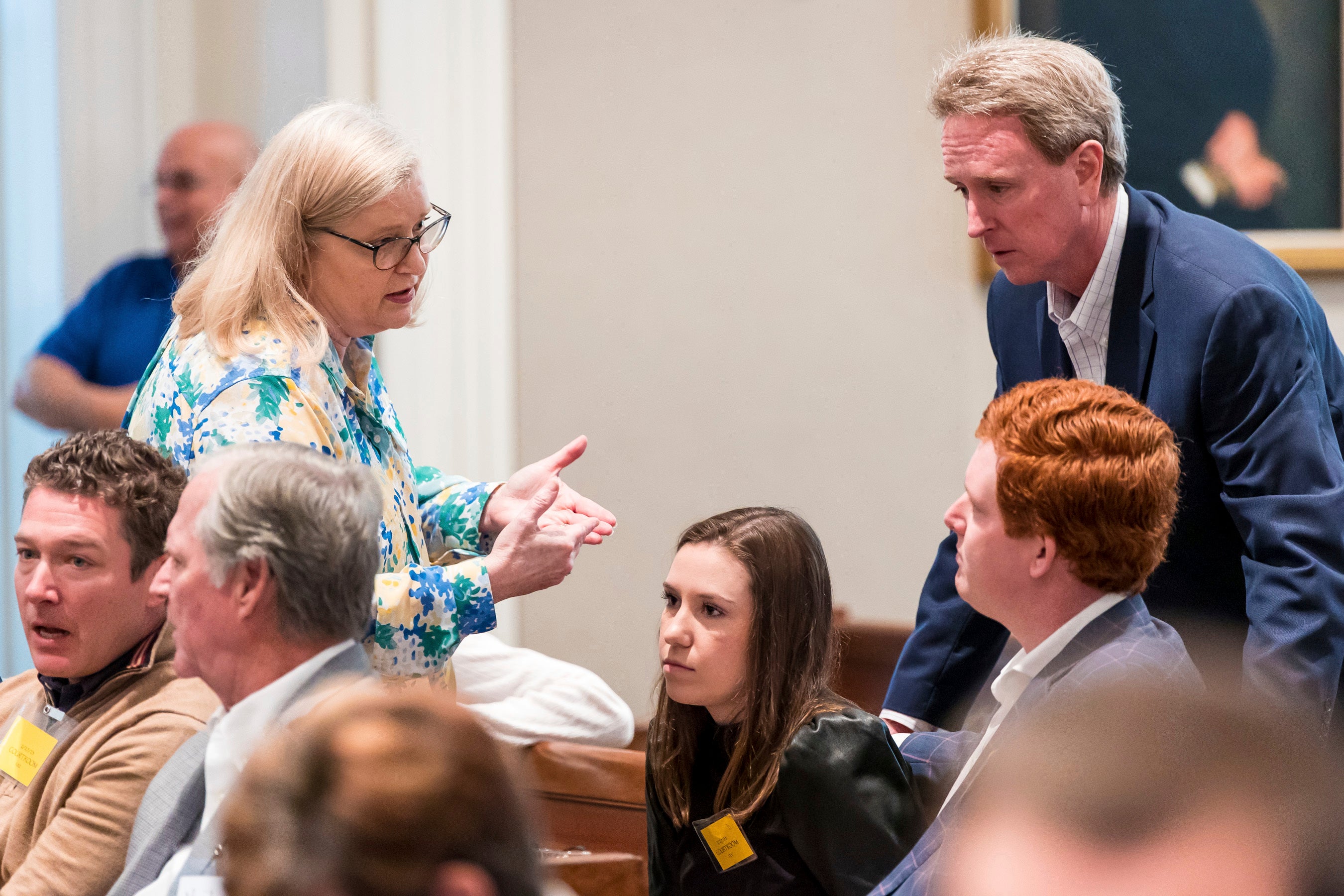
John Marvin said he, his brother and sister were later shown the coat and he said he had never seen it before. However, he said he learned that it had been found in a closet in his parents’ home that was typically used to store “junk”.
A SLED agent also told him that they knew his brother was responsible for the murders because of blood spatter evidence found on the white t-shirt he was wearing the night of the murders.
“They made reference to the shirt Alex was wearing that it was covered in blood,” he said.
“They went so far to tell me on the police bodycam he takes his shirt and wipes his face... and that that’s how they knew that he was at the scene. That he was the one.”
Prior to his indictment, a Colleton County grand jury was told that Murdaugh’s shirt was covered in blood spatter – evidence that he was next to one of the victims when they were shot.
This later turned out to be false, with forensic tests finding no human blood on the shirt.
However, prosecutors allege that Murdaugh actually changed his clothing and showered after the murders.
Pathologist refutes defence experts’ claims about murders
During the prosecution’s rebuttal, Dr Ellen Riemer returned to the stand to push back against the two defence witnesses who argued Paul had been shot in the head at point blank range.
The forensic pathologist who carried out the autopsies on the bodies stood by her conclusions about the victims’ brutal wounds – and said that “there is no way” Paul’s injuries are consistent with a contact shotgun wound to the head.
“The damage to his head wounds would be so much worse,” she said, saying that Paul’s entire head would have been blown off – with both his entire face and skull exploded by the blast.
Instead, she said his face was largely intact and his skull had a large hole in it.
The pathologist, who said that she has carried out around 5,500 autopsies over the years, testified that she also found no evidence of soot or stippling on Paul’s head during the autopsy – something that would be consistent with a contact wound.
She also disputed the defence experts’ testimony on Maggie’s fatal injury saying that the entrance wound in Maggie’s skull could only have come from below.
Multiple rebuttal witnesses contradict Murdaugh’s testimony
During the rebuttal case, the prosecution also sought to show jurors how Murdaugh had continued to lie when he took the stand in his own defence last week – with two of the accused killer’s friends and colleagues, and a law enforcement officer disputing key aspects of his testimony.
Mark Ball returned to the stand to dispute Murdaugh’s claim that he distrusted law enforcement – the reason he gave for why he had lied about his alibi.
“I never heard Alex say he distrusted law enforcement and believed he had a good relationship with law enforcement,” he said.
Mr Ball and Ronnie Crosby – both of whom went to Moselle the night of the murders – both also disputed Murdaugh’s testimony about when he touched Maggie’s and Paul’s bodies.
His two former friends said that he clearly told them after the murders that he touched the bodies prior to calling 911.
Former Hampton County Sheriff T. C. Smalls, the only rebuttal witness who had never before taken the stand, also contradicted Murdaugh’s testimony that he had given him permission to fit blue lights in his vehicle.
“I never had any knowledge that he had blue lights in the vehicle,” said Mr Smalls, who retired in December after 39 years in law enforcement and has known Murdaugh for many years.
Crime scene expert rubbishes theories on 5’2” shooter and Paul’s injuries
Crime scene expert Dr Kenny Kinsey returned to the witness stand as the final rebuttal witness where he rubbished the “preposterous” and “unscientific” defence theories that Maggie was killed by a 5’2” shooter and Paul was shot in the head at point blank range.
In a graphic demonstration in the courtroom, Dr Kinsey and South Carolina Attorney General Alan Wilson acted out the defence’s version of how Paul was murdered – with the killer shooting him in the back of the head at point blank range.
Dr Kinsey testified that the state of the crime scene was inconsistent with the defence’s theory, saying that this wouldn’t have caused blood, brain and other biological matter to hit the doorframe of the feed room.
“To think that the pressure from flesh and bone will cause that pellet ….those steel pellets… They will turn around because of that pressure and go back the opposite direction, a 180 degree direction at enough velocity to hit an exterior and embed in the doorframe that doesn’t happen, that doesn’t happen in my opinion,” he said.
Dr Kinsey said that Paul’s wounds were also inconsistent with the injuries he has seen on around three dozen individuals shot at point blank range in the head saying that “often the eyes will pop out,” the “facial bones will move round” and pieces of pellet gather in the skin.
The crime scene expert also tore apart testimony from defence witness Mr Sutton who had claimed that Maggie was murdered by a 5’2” shooter – and not her 6’4” husband.
Dr Kinsey said Mr Sutton’s conclusion about both the angle of the bullet trajectories and the shooter’s height was “unscientific” and that he disagreed “wholeheartedly” that it would even be possible to come to determine this information.
“The notion of being able to look at this evidence and say that… it’s unscientific,” he said. “It’s an unknown. There so many variables,” he said.
Dr Kinsey testified that the killer “could have been a 5’4”, a 6’4” or a 7’4”.”
Murdaugh is convicted after less than three hours
On 2 March, the jury heard the last arguments from both sides and was sent out to deliberate.
They returned less than three hours later with a guilty verdict.
As the verdict was read out in court, Murdaugh’s face went pale as both he and Buster showed no discernable emotion.
Outside the courtroom, prosecutors greeted cheering crowds to hail the verdict.
Subscribe to Independent Premium to bookmark this article
Want to bookmark your favourite articles and stories to read or reference later? Start your Independent Premium subscription today.



